Dell Technologies World 2024 — all the latest news and updates live as it happened
Dell Technologies World 2024 is a wrap - here's what we saw and heard
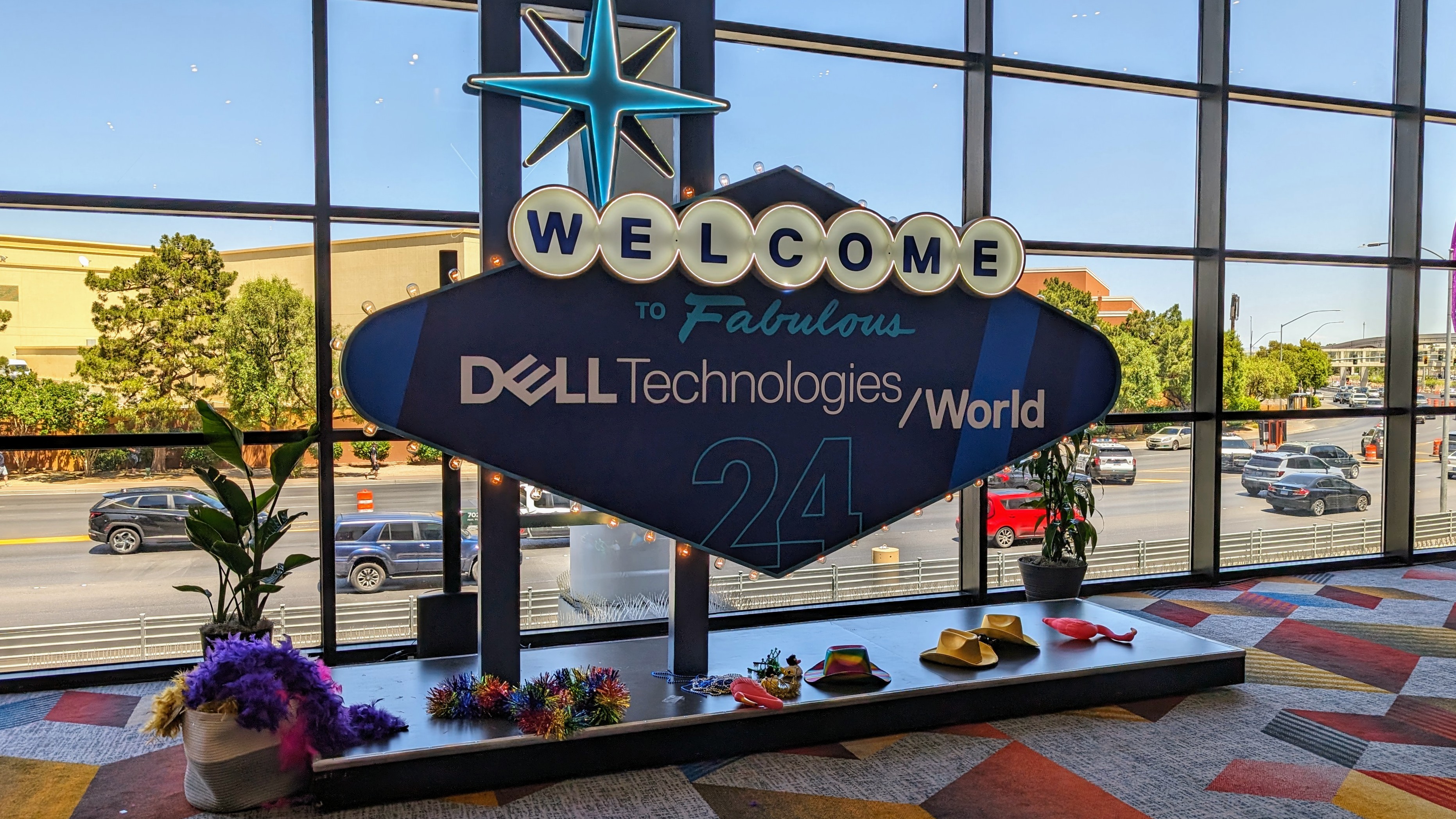
Hello and welcome to our live coverage recap of Dell Technologies World 2024. We were on the ground in Las Vegas for this year's event, which was packed full of news and announcements.
The show included an opening keynote from Chairman and CEO Michael Dell, joined by Bill McDermott, Chairman and CEO, ServiceNow, Jensen Huang, Founder and CEO, NVIDIA and Sungwoo Hwang, President and CEO, Samsung SDS to talk all things computing, AI and cloud. But there was also a plenary session from musical stars the Chainsmokers and T-Pain discussing the collision between AI and music.
Day two contained a keynote hosted by Jeff Clarke, Vice Chairman and Chief Operating Officer at Dell Technologies, taking a deeper dive into some of the bigger news stories and releases - but if you missed anything, you can review all the latest updates below.
So what can we expect from Dell Technologies World 2024?
The show opens with a keynote hosted by company chairman and CEO Michael Dell, who will be joined by some very special guests.
Day two is set to focus more on AI, with a keynote hosted by Jeff Clarke, Vice Chairman and Chief Operating Officer, Dell Technologies.
But there's also breakout sessions by some very intruiging guests from the musical and entertainment world - stay tuned to find out more....
Good morning from beautifully sunny Las Vegas! We're excited to get going with Dell Technologies World 2024, so will be heading down to the keynote later, where Chairman and CEO and Michael Dell will be kicking things off.
How many times will we hear the phrase "AI" today?
As is traditional now for many tech conferences in Las Vegas, Dell has sponsored the Sphere to promote the event - and we got a pretty good view of it from our hotel room!
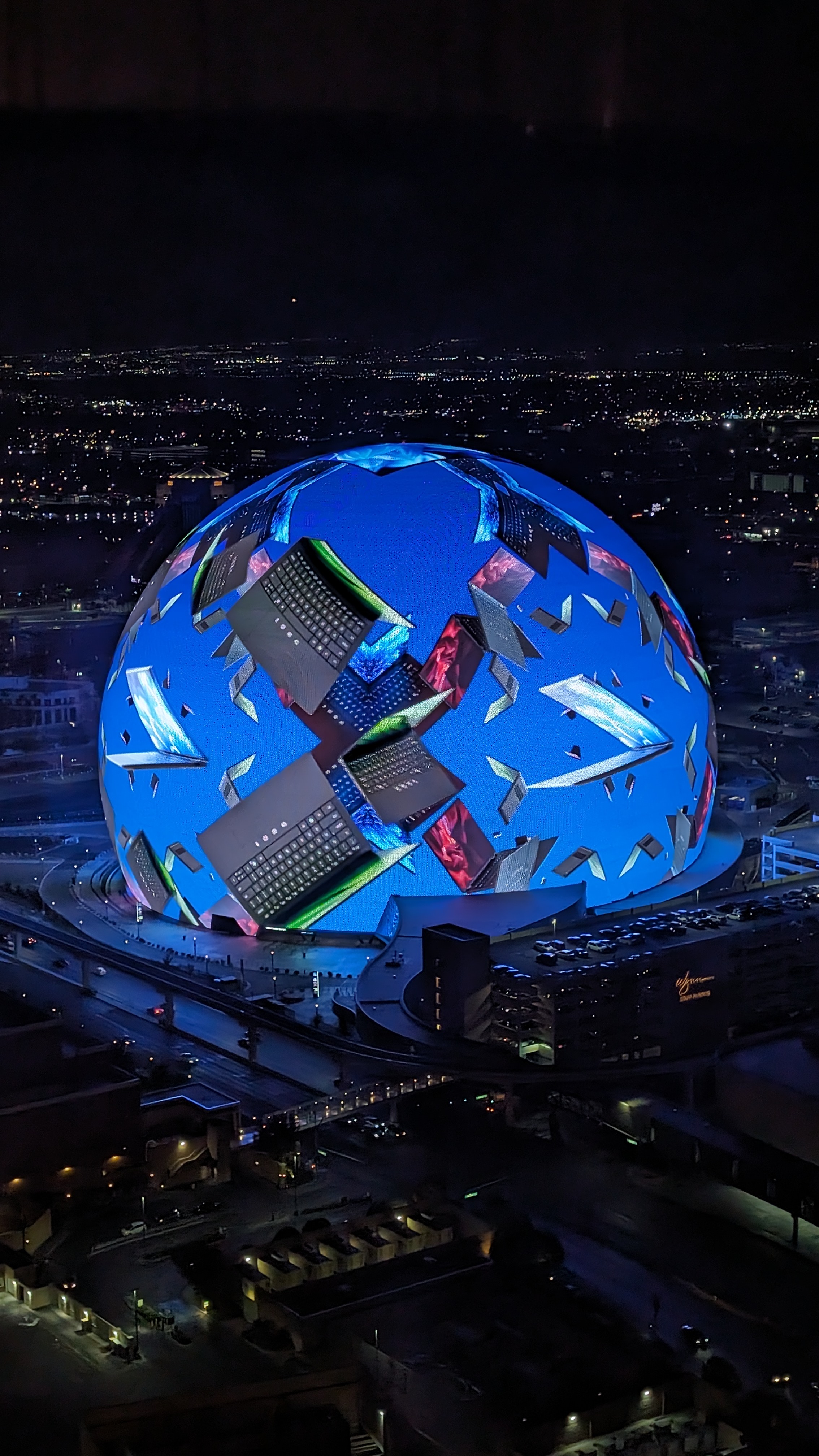
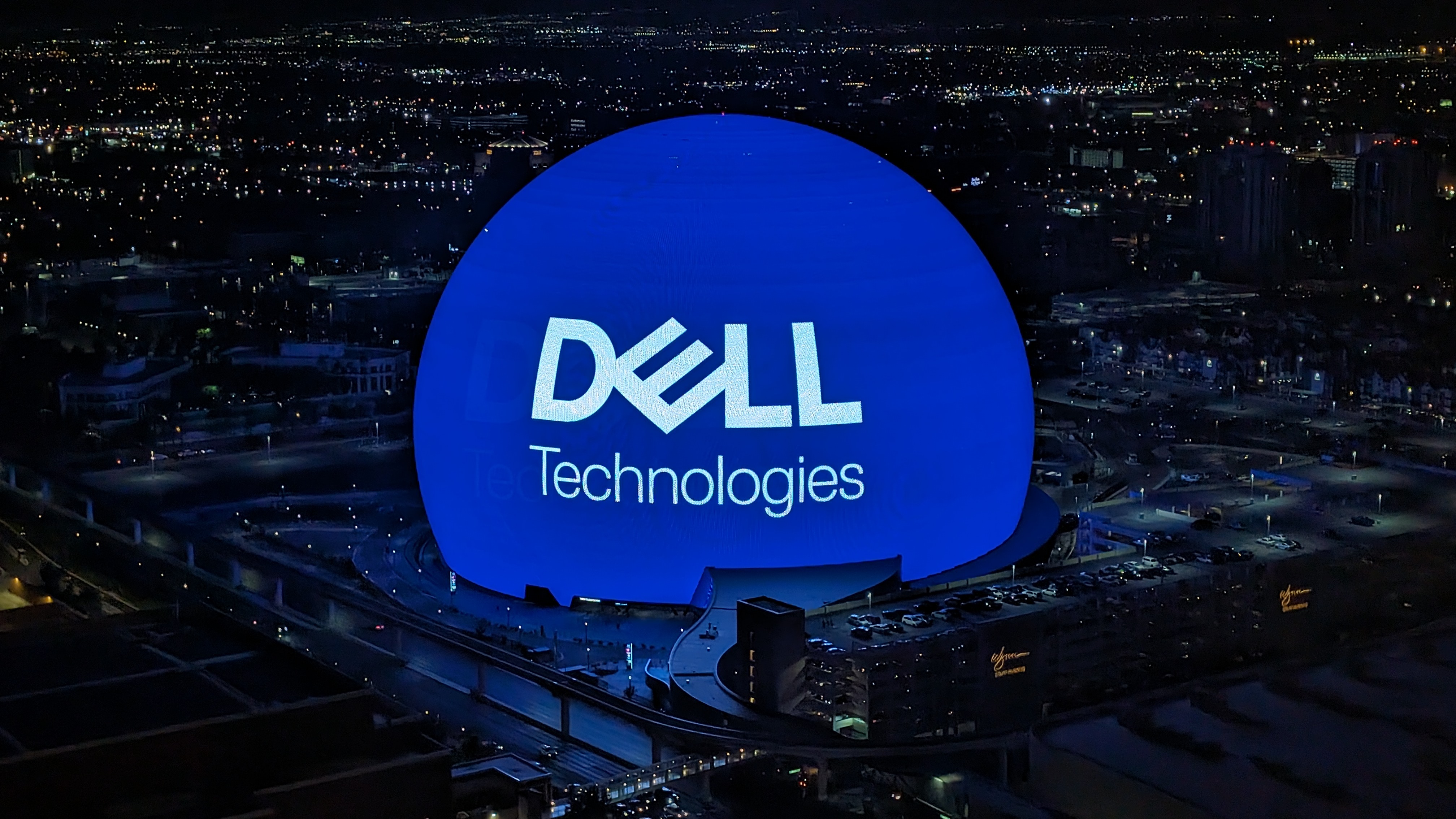

And there is an Elvis impersonator at registration...because, you know, Vegas!
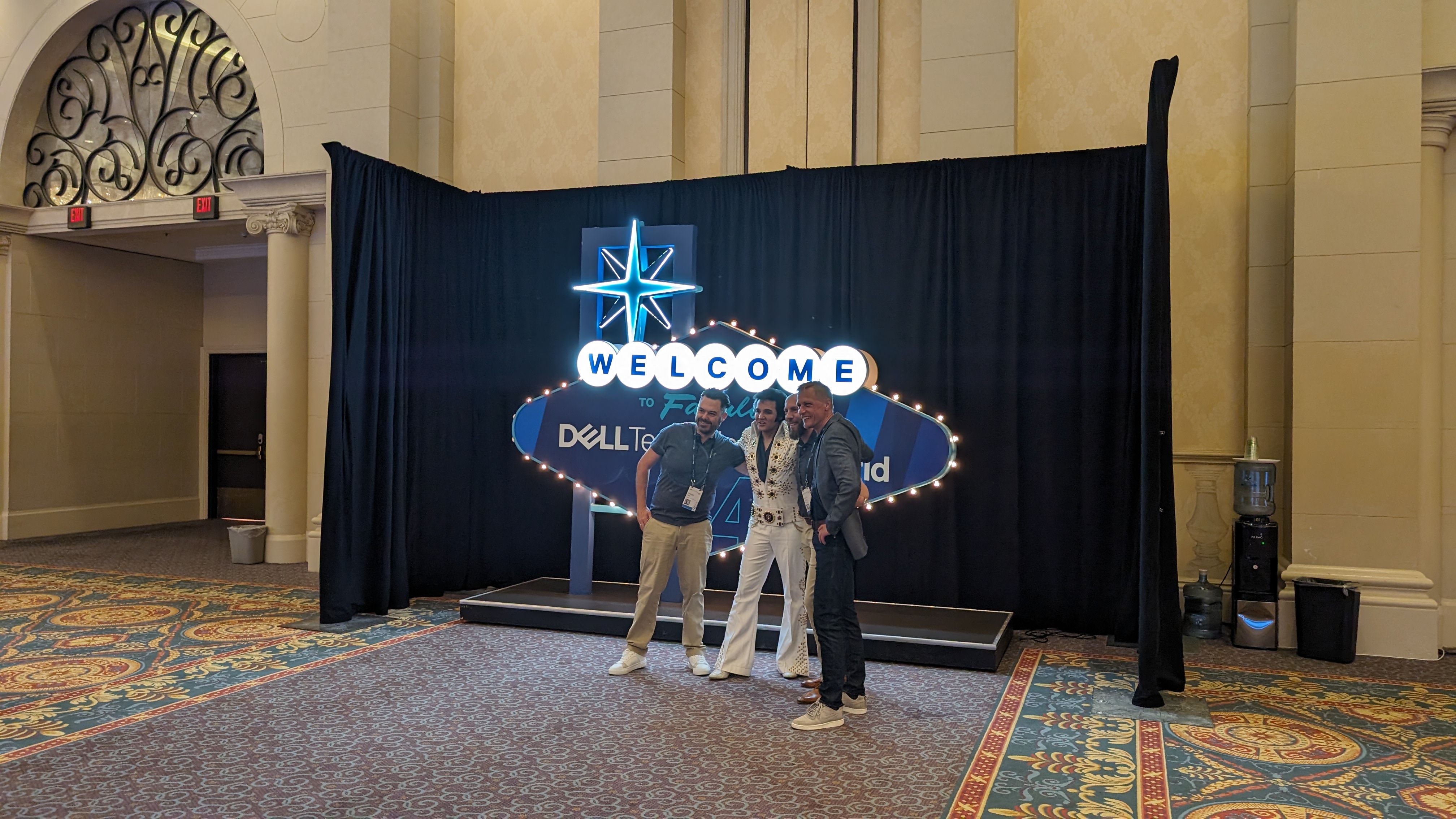
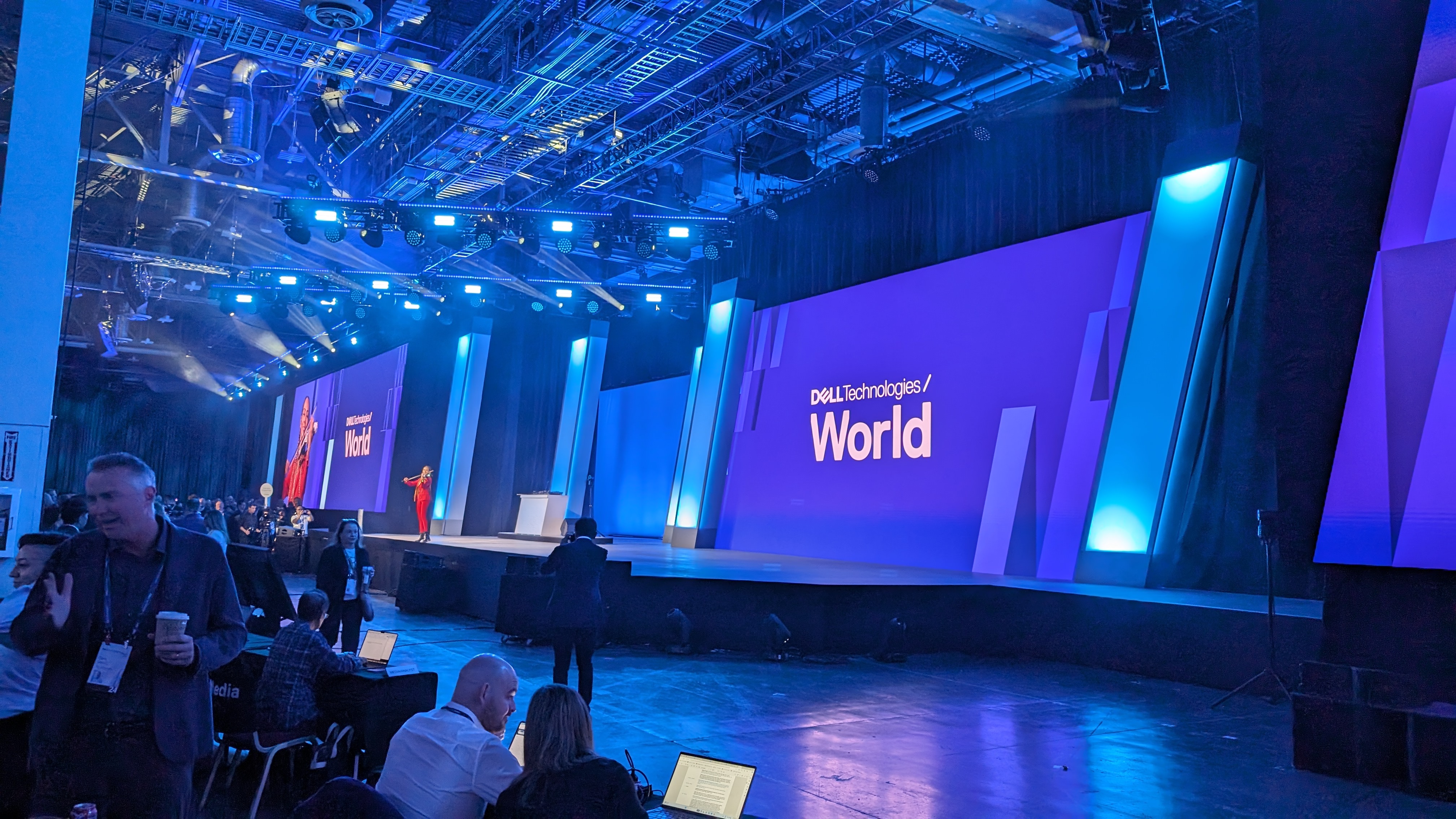
We're in and seated ahead of the keynote - as usual, it's time for some ear-splitting techno to get us all warmed up...just what you want at 9.30am, right?
So how many times will we hear the words "artificial intelligence" today?
I would say play along at home, but I think we'll lose count within the first quarter of an hour...but with Dell having influence across a wide range of tech sectors, it is sure to play a major role.
Here we go - the lights go down, and after a brief video extolling the virtues of AI (surprise surprise), which was apparently used to make the video - it's time to kick off.
Michael Dell, Chairman and CEO, takes to the stage.
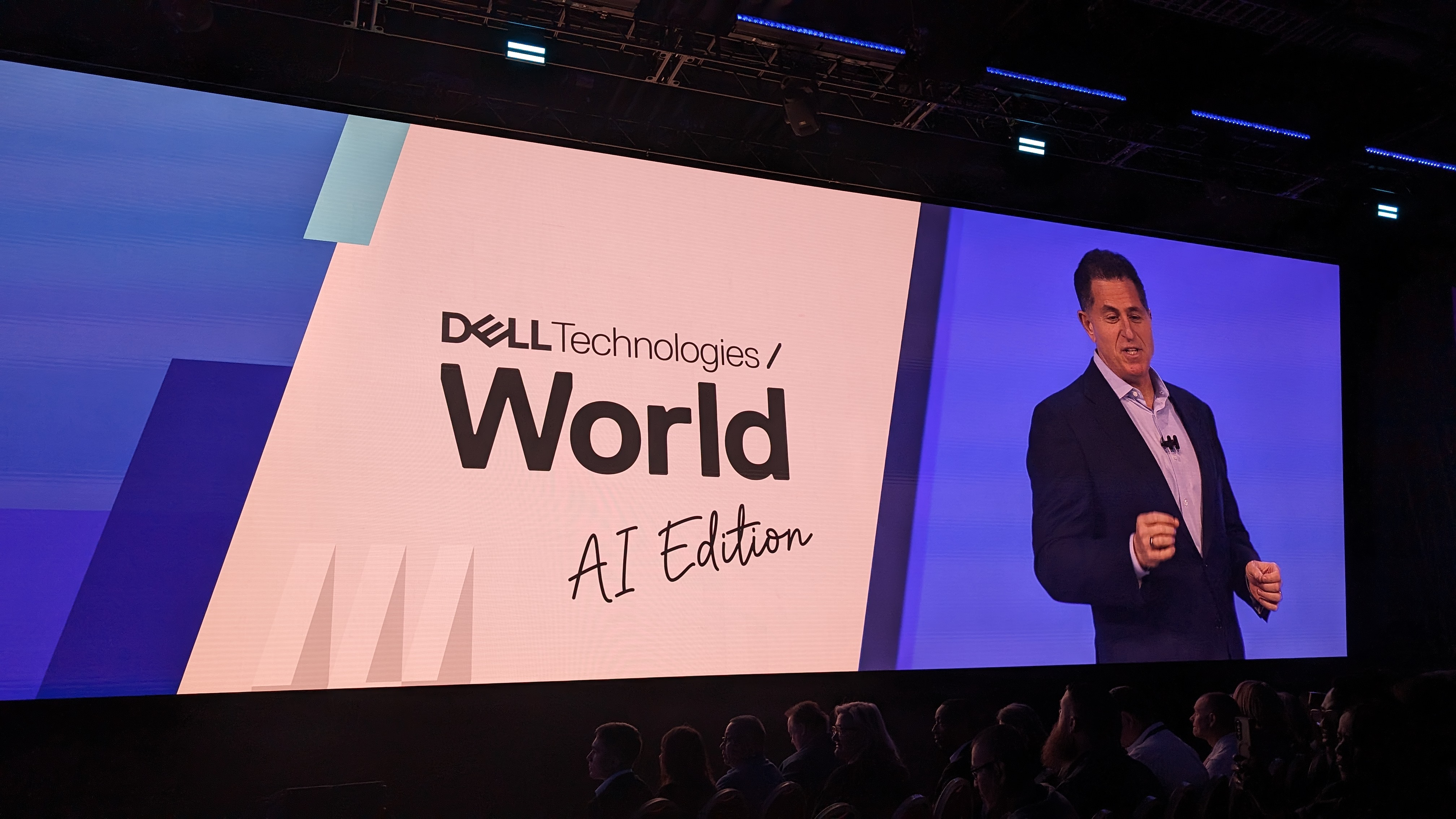
Customers are putting their data to work, and Dell wants to help encourage companies to embrace AI.
"We have built Dell Technologies to be your trusted partner," Mr Dell says, highlighting that the company celebrated its 40th birthday this year.
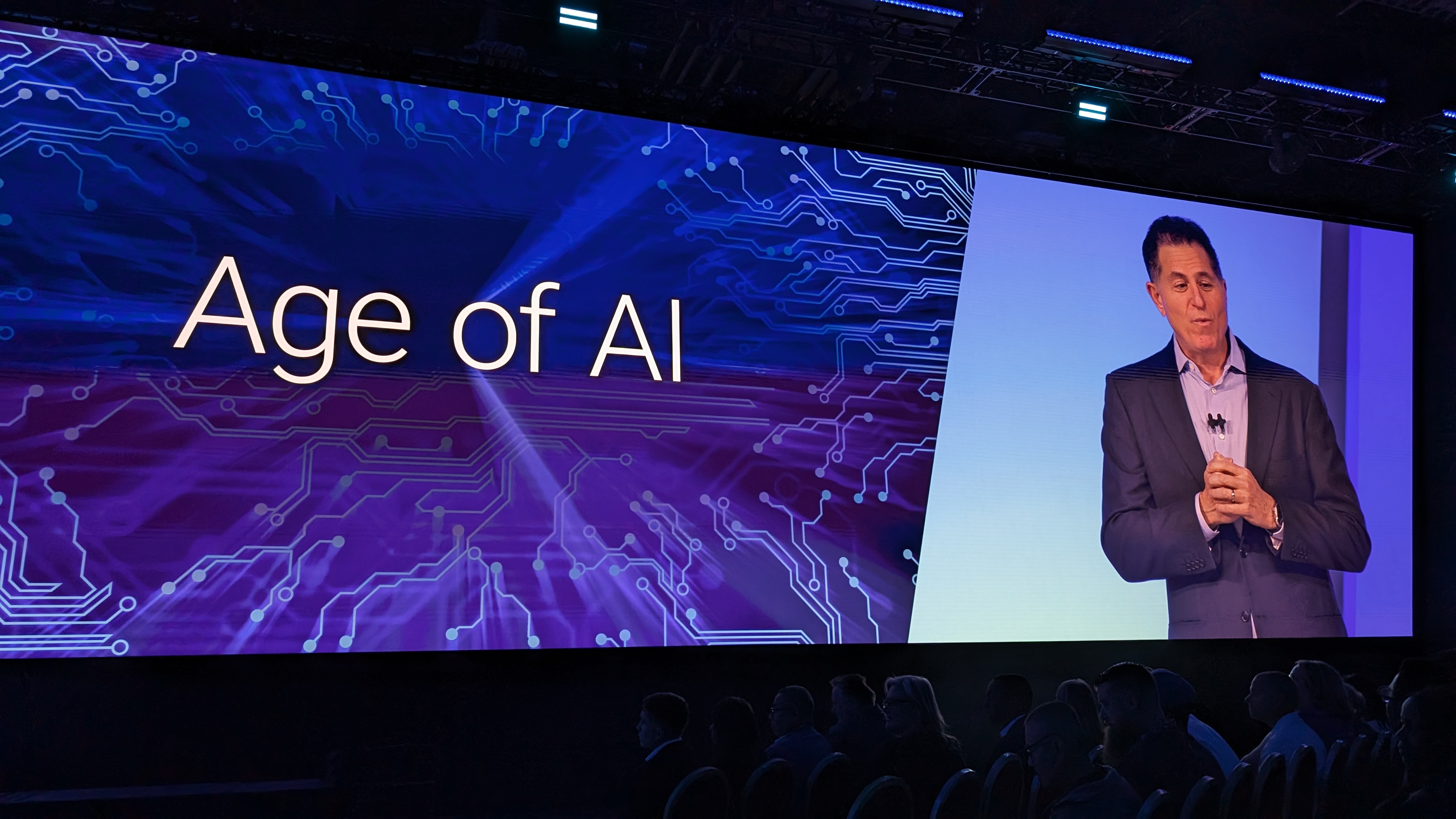
"Human providence has increased by orders of magnitude...it's been one hell of a ride," Dell says - but this is only the start.
"We're moving from computation to cognition - towards the age of AI," he says.
"We are unleashing technology that will unleash scientific technology and development...to transform how we live and work."
Likening AI development to early mills, he says that AI can provide a wide range of innovations and progress.
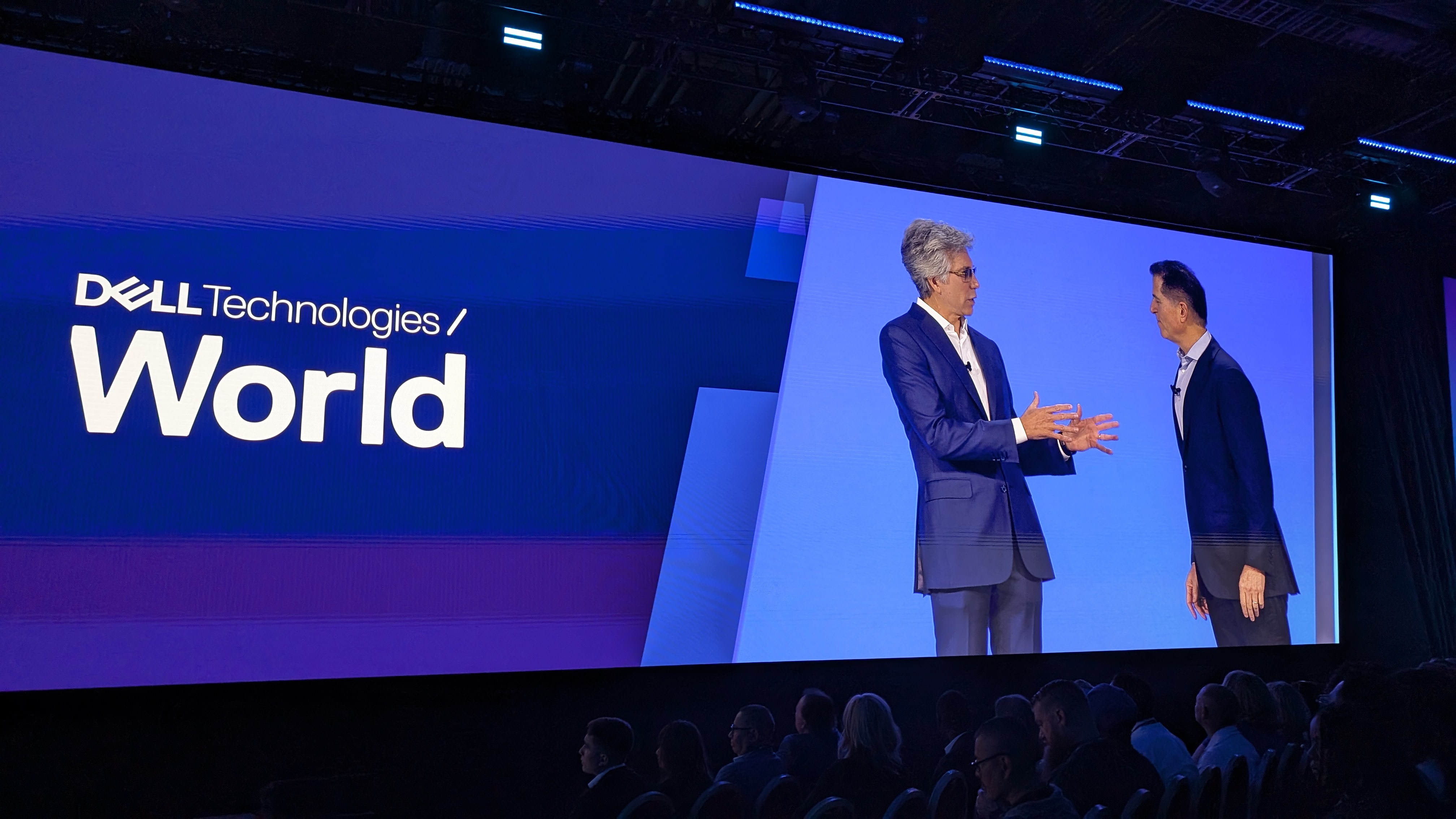
It's time for our first guest - Bill McDermott, Chairman and CEO, ServiceNow, equipped with full Vegas-style suit and sunglasses.
He's keen to promote how ServiceNow can help companies also make the most of AI and innovation, with a new "revolution" driving "unbelievable acceleration"
"Every industry in the world will be changed with Gen AI," McDermott says. "This is really big, and it's moving really fast."
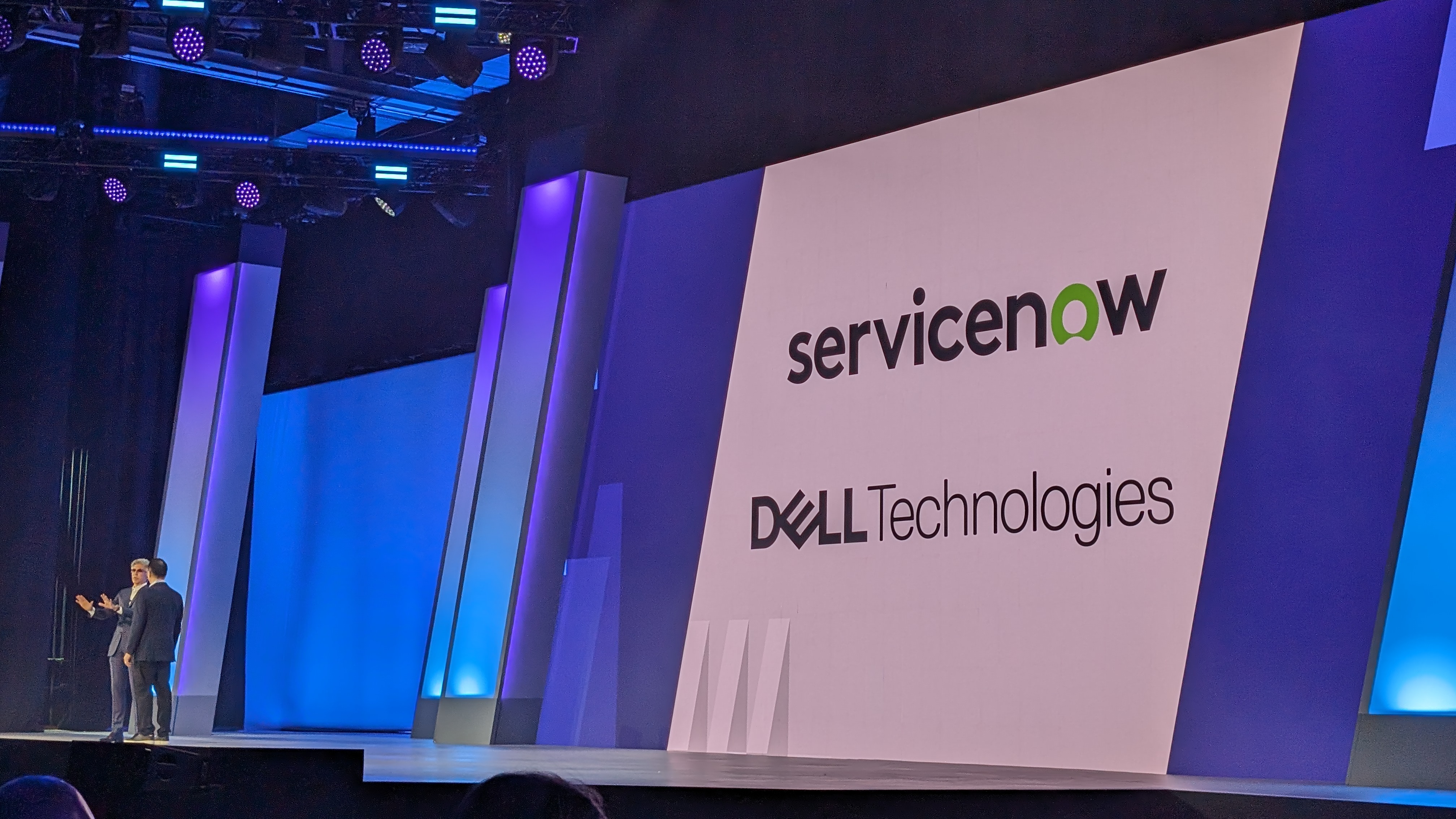
McDermott says he believes every company has to become an intelligence company in the age of AI - but speed will be the difference - can your company make the most of the innovations early enough?
"I think AI is leading to a new era," he says, "where everything will be digitized."
After that incredibly hyped-up view of AI, (and a major love-in between McDermott and his host) Michael Dell looks to move things on by turning to making the most out of data.
"What we've learned over time is that you don't want to bring all your data to a publicized cloud," he notes - highlighting some of the cost issues when it comes to public vs private cloud alone.
Inference and data gravity are the main issues, he says - "you want to bring AI to your data, not the other way around."
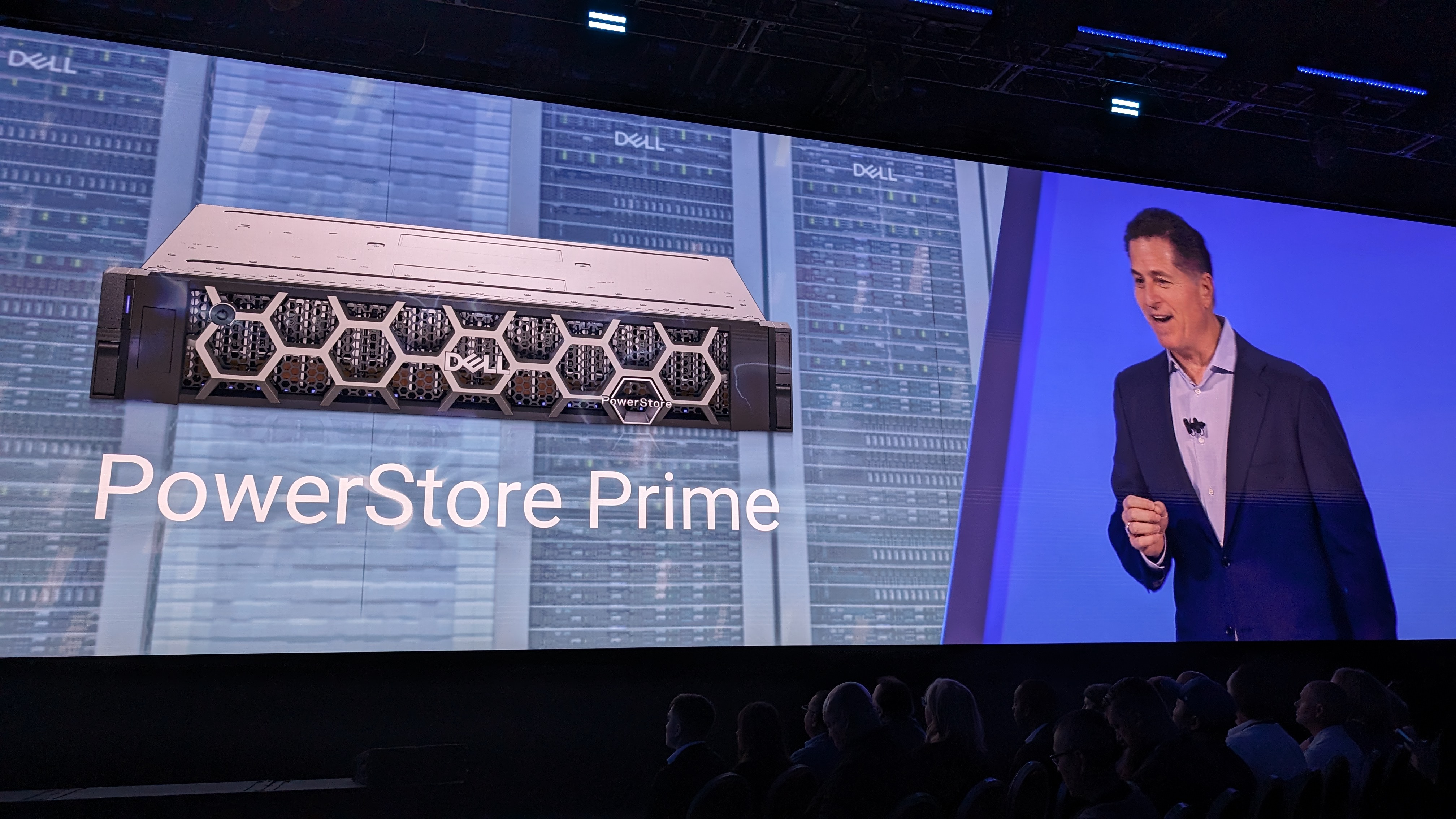
"Data has been, and is, at the center of everything - it is the rocket fuel," Dell says.
"No one has provided more data storage than Dell - and we're pulling away," he notes, announcing the new PowerStore Prime storage product - with up to 66% more performance, and "world-class" efficiency.
Moving to unstructured data, Dell announces the new PowerScale F910, which he says can "feed the beast of accelerated computing".
There's also the PowerEdge XE9680 - "at the heart of the AI factory", he notes - offering industry-high power that will make generative AI easier to access for more companies.
Lightning-fast networks are on offer via new PowerSwitch products, developed alongside Broadcom and Nvidia.
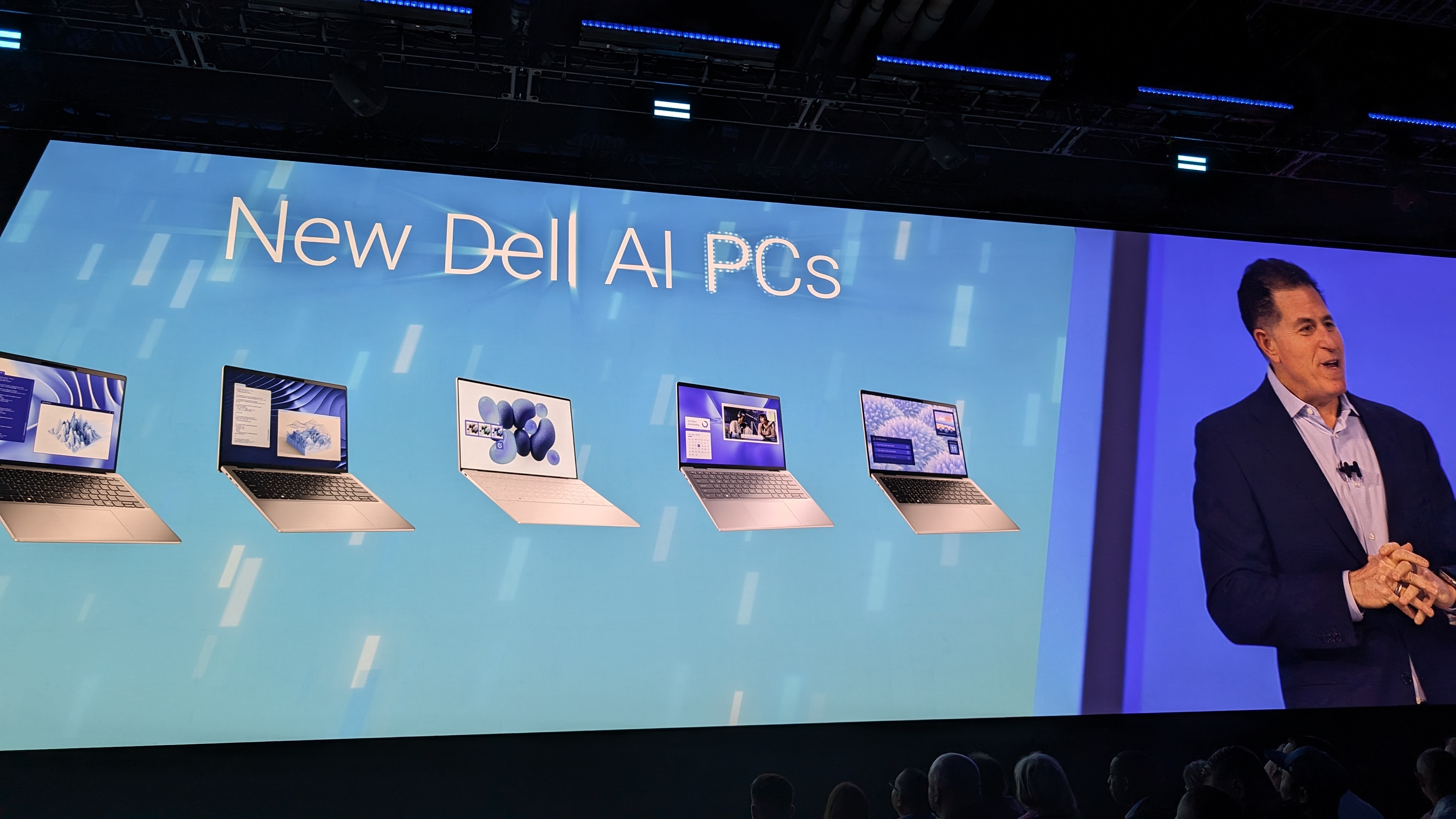
Turning to data centers, specifically at the edge Dell gives us a look at inferencing, personalization and AI assistance.
He says the company's PCs are "an essential part" of the compute engine for inference at the edge.
To go along with Microsoft's new Copilot Plus, there are no less than 5 new Dell AI PCs featuring the new AI platform, offering unmatched speed and efficiency alongside all-day battery life.
"Our ecosystem is bursting with innovation," he says.
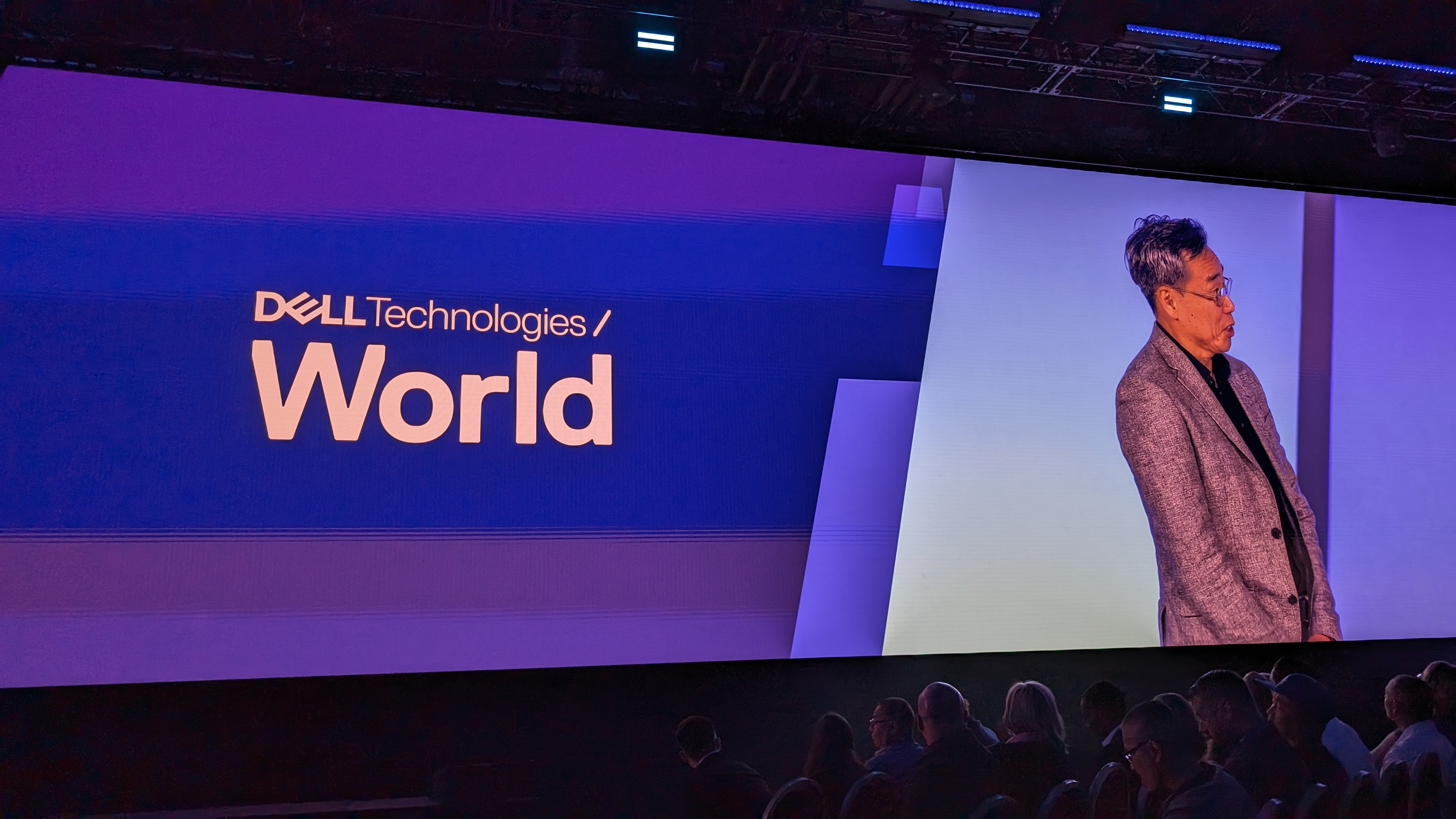
Our next guest is Sungwoo Hwang, President and CEO, Samsung SDS, the company responsible for helping push Samsung's AI mission, including providing cloud and AI tools to customers across the world.
Hwang notes how Dell is helping the company by boosting automation, especially when building LLMs on-prem.
Hwang adds that Dell is providing Samsung SDS with PowerEdge servers, helping it to serve more customers than ever, as well as boosting security and customized AI service development.
Next up, we're turning to the company itself - Dell is calling out the amazing work done by his employees, and how it has helped the company and his customer base grow.
"We're reinventing ourselves once again to be a better partner for you," he notes, saying the company is evolving its gen AI view as customers demand it.
"It's both a sprint and a marathon," Dell says. "The uptake and demand for AI is unprecedented - it will touch each industry, in every organization."
"The AI wave is massive," he adds, with the demand for tokens beginning to grow to over 1 quadrillion by 2028.
"Eventually, the application of AI will be like the internet - it will be as ubiquitous as the Internet, as electricity," he says.
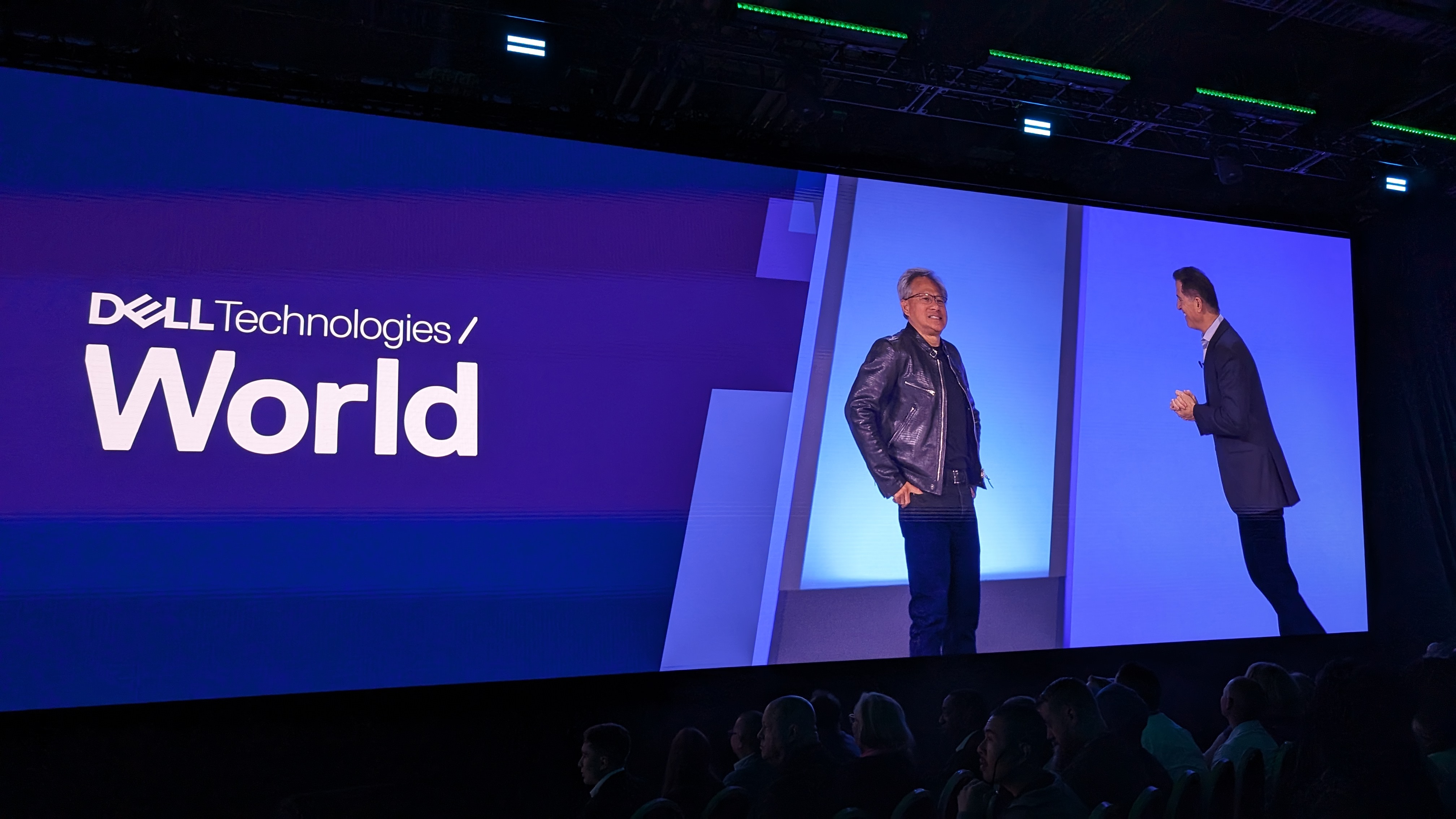
And here's our biggest VIP guest - Jensen Huang, Founder and CEO, NVIDIA.
The leather jacket game, as always, is strong - I'm pretty sure it's the same one he was wearing at Nvidia GTC 2024 a few weeks ago though!
Dell and Nvidia have been partners for decades, and Michael asks Jensen about the "AI revolution".
"The big idea of AI, no matter the source...is that we could learn the meaning of information from the data," Huang notes. And now we have the ability to generate information, this is going to the next level - "we're now producing intelligence", as Huang says.
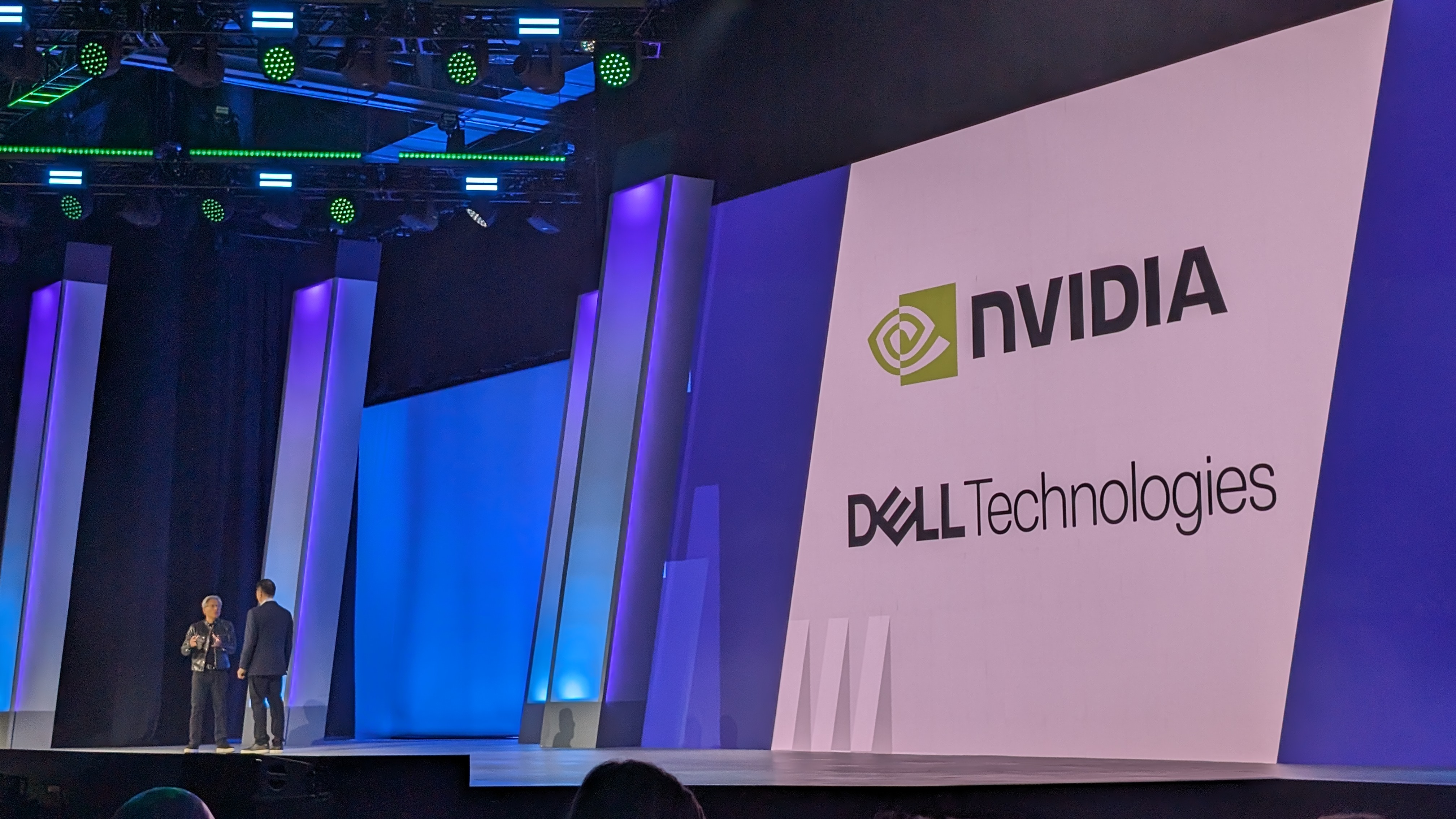
Huang notes the opportunity of modernizing data centers that were created for the last generation of computing (pre-AI) and how new "AI factories" will be the next big leap forward - with data coming in, and tokens coming out.
"Every aspect of computing is being changed," he notes.
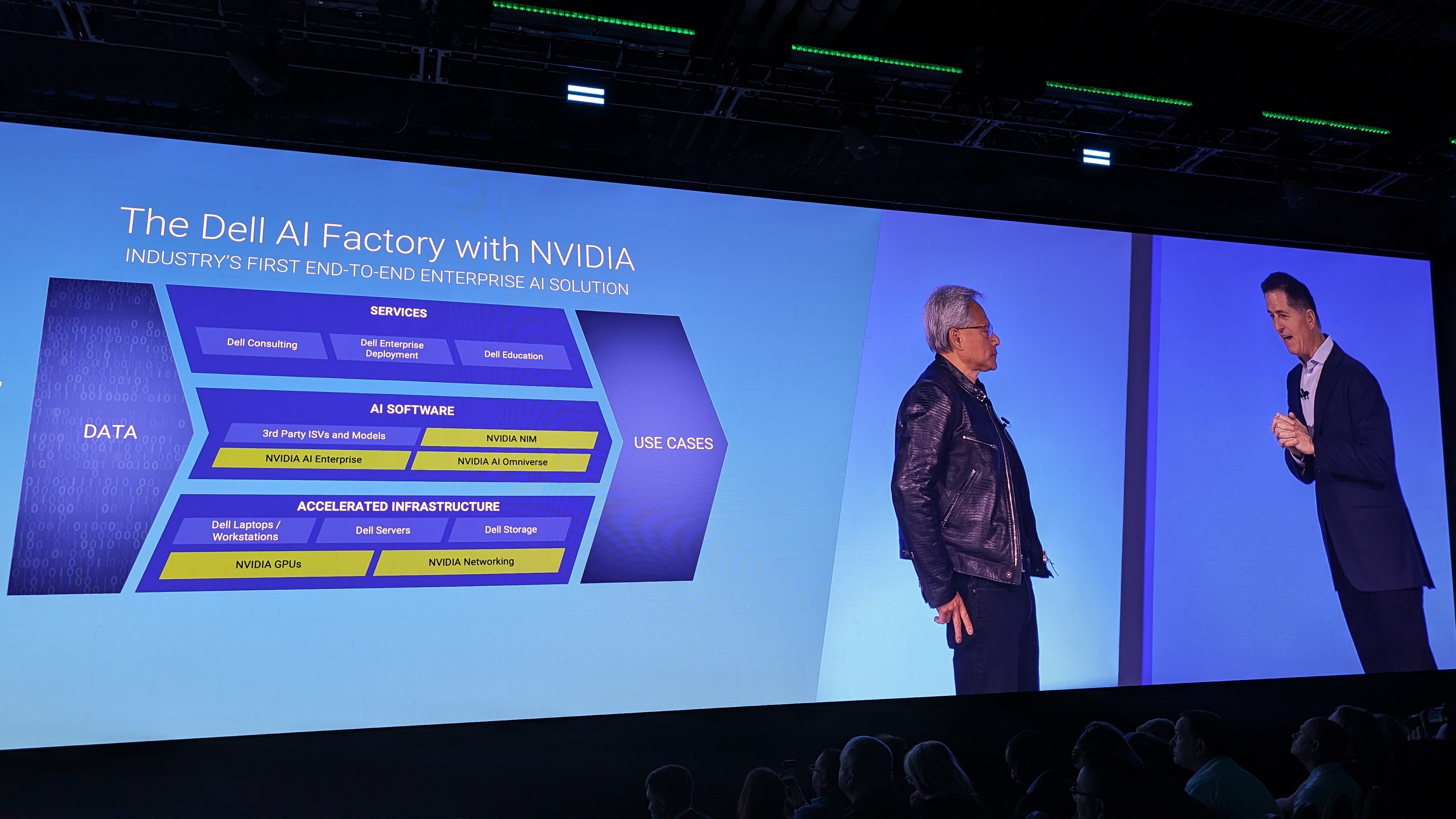
Huang notes the opportunity of modernizing data centers that were created for the last generation of computing (pre-AI) and how new "AI factories" will be the next big leap forward - with data coming in, and tokens coming out.
The companies are today announcing a new "AI factory" platform that brings all this hardware and software together, utilizing Nvidia's newest Blackwell-powered kit.
The partnership between Nvidia and Dell is going to be the biggest go-to-market in AI computing in history, Huang notes - as Dell is the only company that offers such a breadth of technology and services.
"We have two things we need to do," Huang says - modernizing billions of dollars of outdated data centers, and building AI factories for these other industries.
And with that, Jensen Huang heads off to a rapturous farewell.
To wrap up now, Dell is telling us to look at the big picture when it comes to AI
"The real question isn't how big AI can be, but how much is AI going to do?" Dell asks, highlighting there is still a lot we don't know, and how in the wrong hands, it can be a possible threat.
"Eventually, AI will be at the center of all of our lives," he says, so it's important to ensure it is trained properly.
But it will also take a lot of energy, and Dell says it is committed to running the greenest infrastructure possible - including sustainable data centers, smart power management, and green and renewable energy sources.
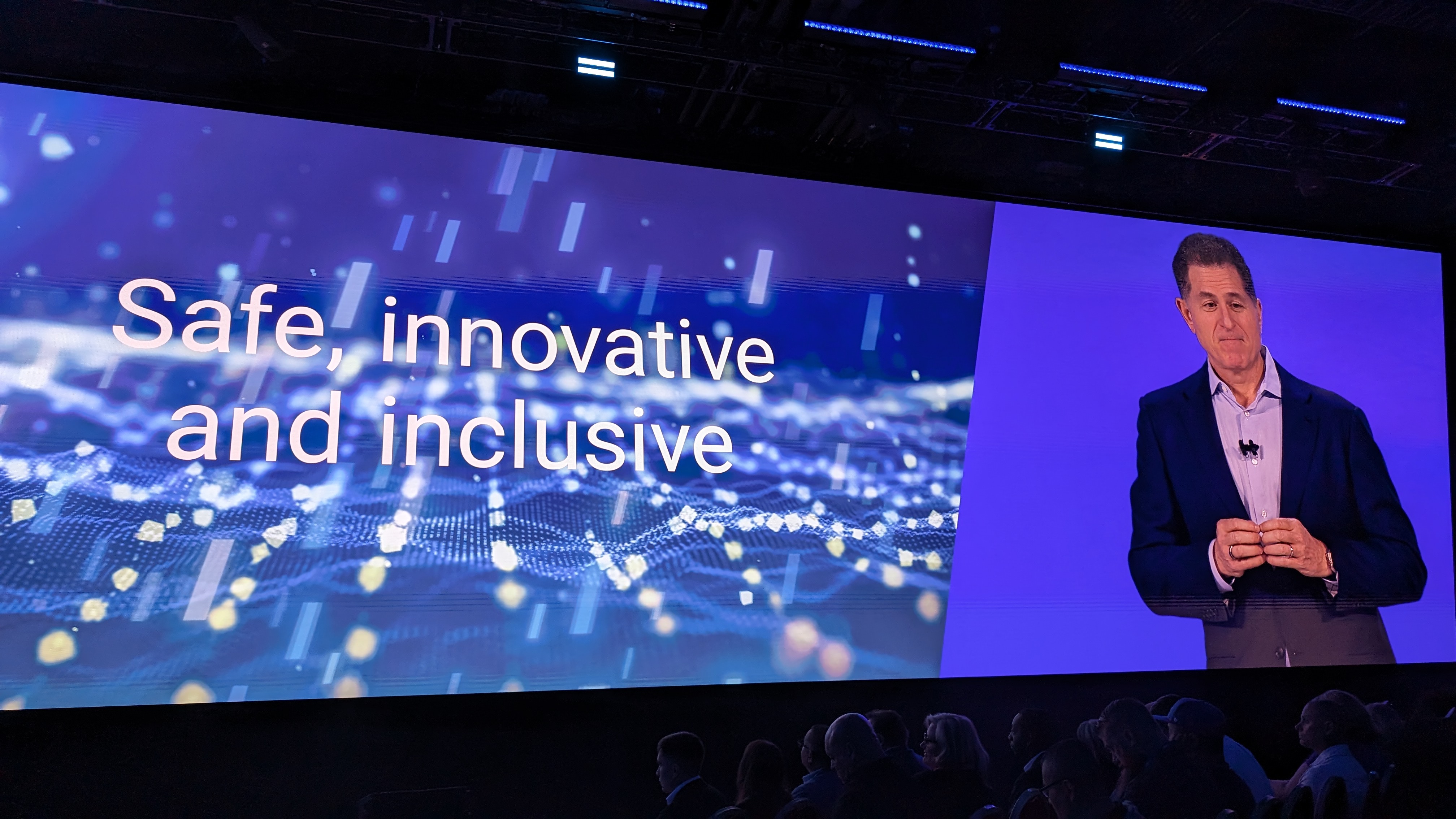
"For us to realise the possibilities of AI, we need to do it respnsbily, and address the barriers to adoption holistically," Dell says, saying the company is ready to stand with governments.
The company calls its viewpoint "AI for human progress" and we're seeing a few examples now - including how doctors are using AI to progress research, food producers are boosting sustainability, and stduents are using AI tools to keep societies safe and secure.
"We are at the dawn of a new age of cognition - the age of AI...and the possibilities are embedding the spirit of today's greatest innovators," Dell says.
All of Dell's VIP guests are now coming back on stage, along with student innovators, to lap up the acclaim of the crowd.
And with that, it's a wrap on the day one keynote - but there is plenty more to come today, so stay tuned to TechRadar Pro throughout the day.
After a short break, we're back with a Q&A with Michael Dell and Jeff Clarke, Vice Chairman and Chief Operating Officer, Dell Technologies.
Although they're actually 15 minutes late...what could be going on backstage?
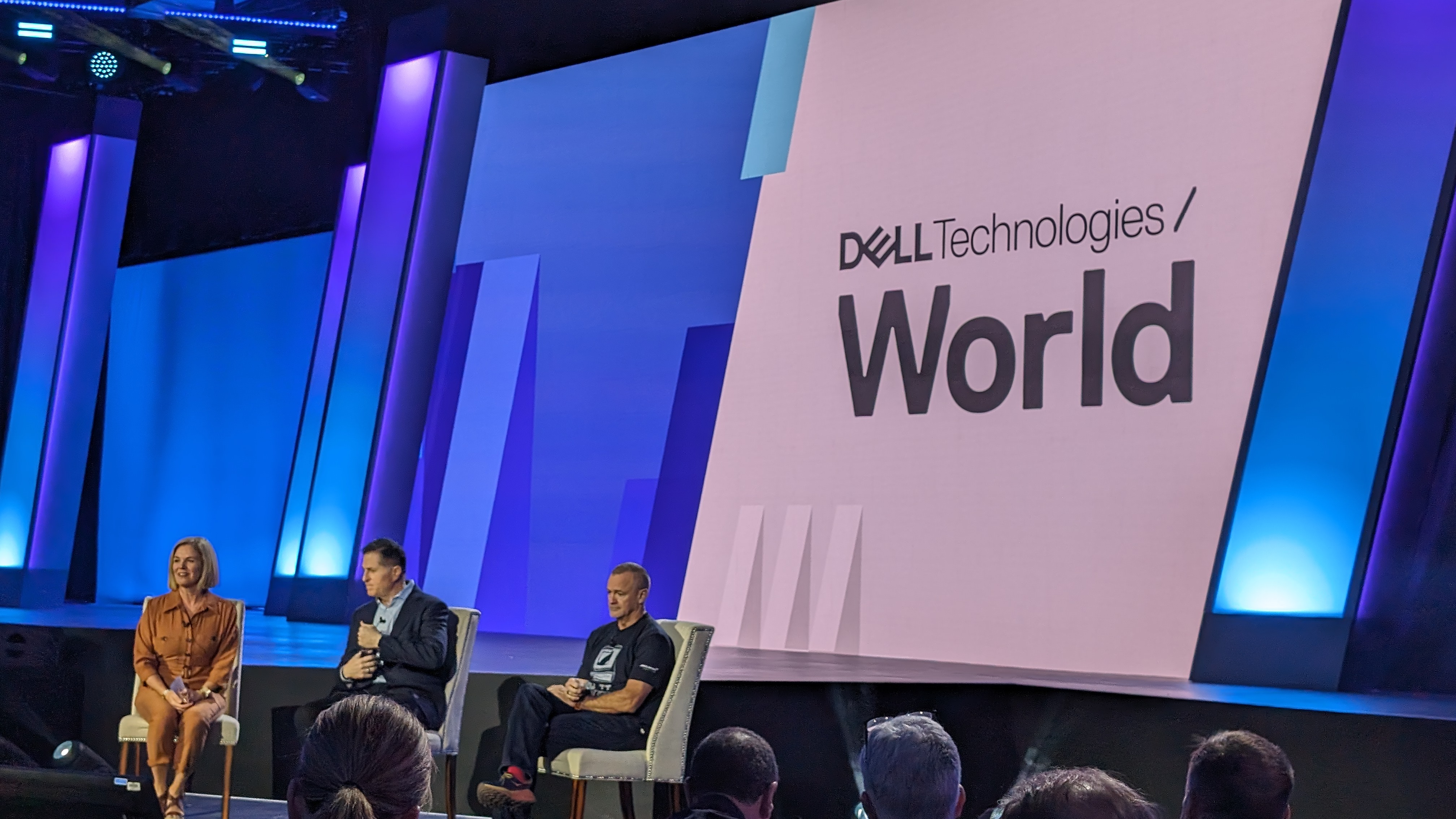
Here we go! First up, a question about customer demands and requests.
Dell refers back to the idea of the AI factory - "if you don't have any data, you don't have any AI," he notes.
But the whole Dell portfolio is able to come together to offer customers a well-rounded product.
"While everyone's data is unique, the problems are usually the same, " he says.
Next question is for Jeff Clarke, concerning AI and coding/development within Dell, such as in customer services and supply chains.
Clarke says the company has identified five key areas - including content creation, R&D, customer service, sales and marketing, and supply chain.
He adds the company needed to standardize processes to make sure using AI is actually efficient.
This helping add in areas such as predictive maintenance and care, helping spot any potential issues before they cause too much disruption.
The next question is around the rate of maturity from customers - are many of them at the same place, or are they embracing AI already?
"It's a multi-speed world," Dell notes, saying some companies are obviously more "aggressive" than others when it comes to AI - and many who are still trying to figure out the right use cases.
With investors and bosses asking for more AI, no matter what level, this so-called digital transfromation is still dominating the conversations Dell says he has all over the world.
The next question is about checks and balances concerning AI - how do we make sure it is going to be used for good?
Dell assures us his company has a strong set of rules and regulations around the responsible use of AI - but that there is always the possibility of some bad apples.
"The computer doesn't know what it's going to do when it leaves the factory," he says.
Clarke expounds a little more on Dell's responsible AI policy, noting there is an active governance policy on every project carried out by the company.
Moving on to a question about AI PCs, especially with Microsoft's new Copilot Plus platform and Qualcomm's Snapdragon AI chips.
Clarke says it often leads to extra power and efficiency compared to some other platforms - NPUs can do more than previous CPU offerings ever could.
Dell backs this up by outlining how a better experience for the user, using AI, is something many companies want to provide - and offering NPU-powered PCs is a step towards that.
Next up, is there a difference in reception from big to smaller AI models, and will Dell focus more on one or the other?
Dell notes that for many companies, there will be lots of models running at the same time, so the focus is probably more towards making sure the opportunity to get the most out of your data, using the right hardware, is key.
That's a wrap on the Q&A - we're off to grab some lunch, but we'll be back shortly with an afternoon session that we think might offer a pretty unique take on AI...
We're back, and all set for this afternoon's "Trailblazer" session, which unsurpisingly is about AI...but perhaps more surprisingly, features The Chainsmokers and T-Pain talking to Gerri Tunnell, Chief Marketing Officer, Dell Technologies, about the usage of the technology in the music industry.
What's T-Pain's favorite LLM? We might be about to find out....
"Ai is ushering in a new age of expression in the music industry," Turnell says, introducing The Chainsmokers and T-Pain to the stage.
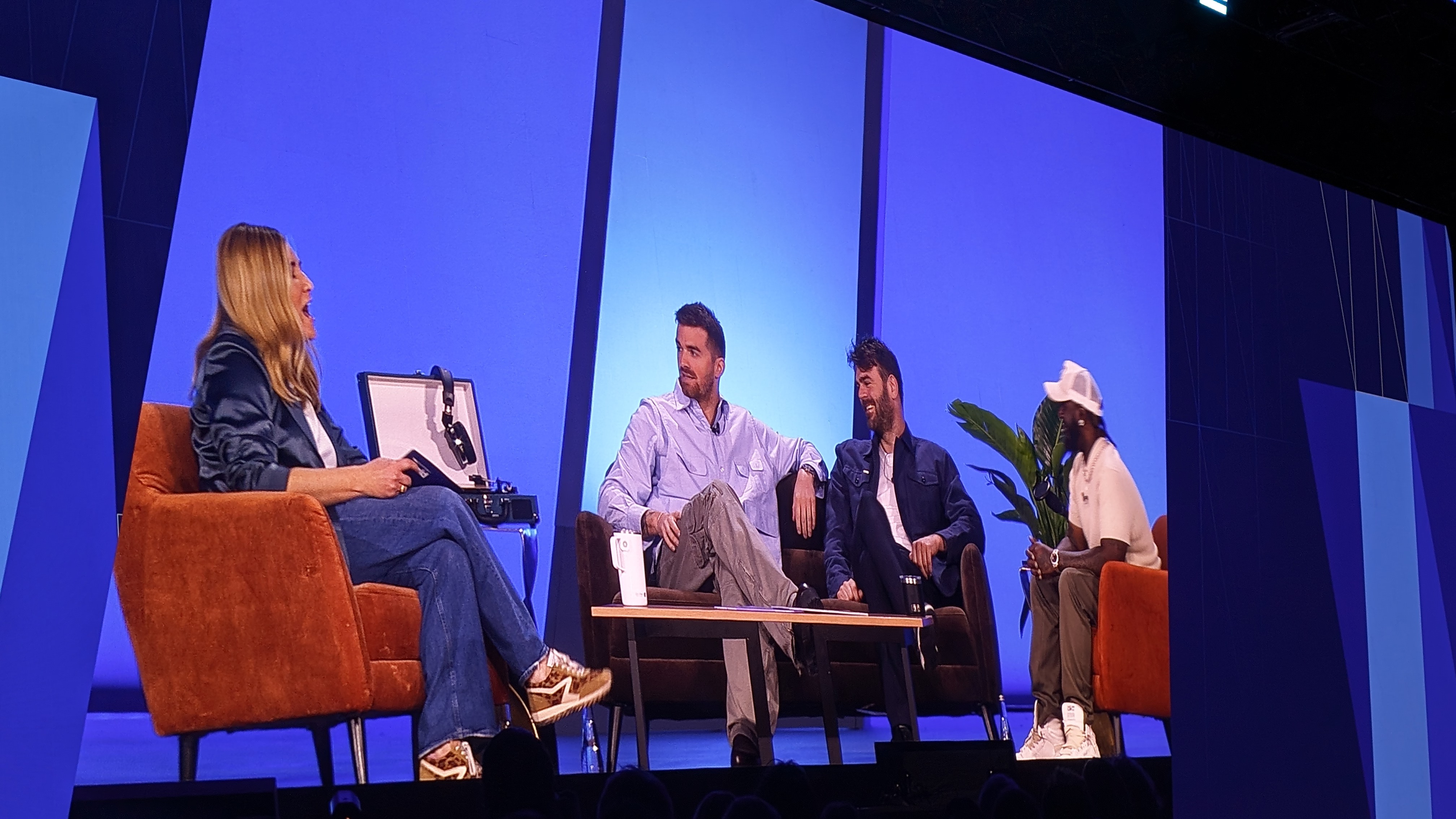
T-Pain is, of course, a major innovator in the music technology space, pioneering that late 2000's/early 2010's autotune trend.
He says he doesn't believe will replace artists, and that "AI is only as smart as what you teach it."
"There's always going to be tech, there's always going to be a difference of opinion," T-Pain says - noting that you can usually tell pretty quickly when music is AI-generated.
"There's always going to be ways where people look to push tech into what humans are doing."
For their part, the Chainsmokers say they are looking into using AI for generating artwork, design pieces and more - if not just for getting exactly the pieces they want, saving money and time...
"This could make a new generation of creators...but remember that making music is meant to be fun!" Chainsmoker 1 (they do have names, but we haven't been told which is which) says.
T-Pain says songs often get lost in translation between creation and production, but AI can possibly help with that.
"I don't think it's going to replace anything - but it can enhance everything," he says, noting that a lot of software and code has been created by people who aren't actually musicians.
AI could even help artists hit by sickness, or try and push musicality a little further, both groups agree - if you have something that might be a little too hard for human hands, why not utilize it?
The Chainsmokers have been playing around with some open-source AI tools, and we're given a look at some frankly quite terrifying clips made with Stable Diffusion technology.
To them, it was a fast way to get a video produced and sent out for a new song that previously could have taken weeks or months to make.
T-Pain has also been experimenting with AI - but in a slightly different way, as he's been part of a project that AI generates songs in the style of a certain artist.
He admits it was pretty mind-blowing, but also slightly scary in terms of legal or copyright issues.
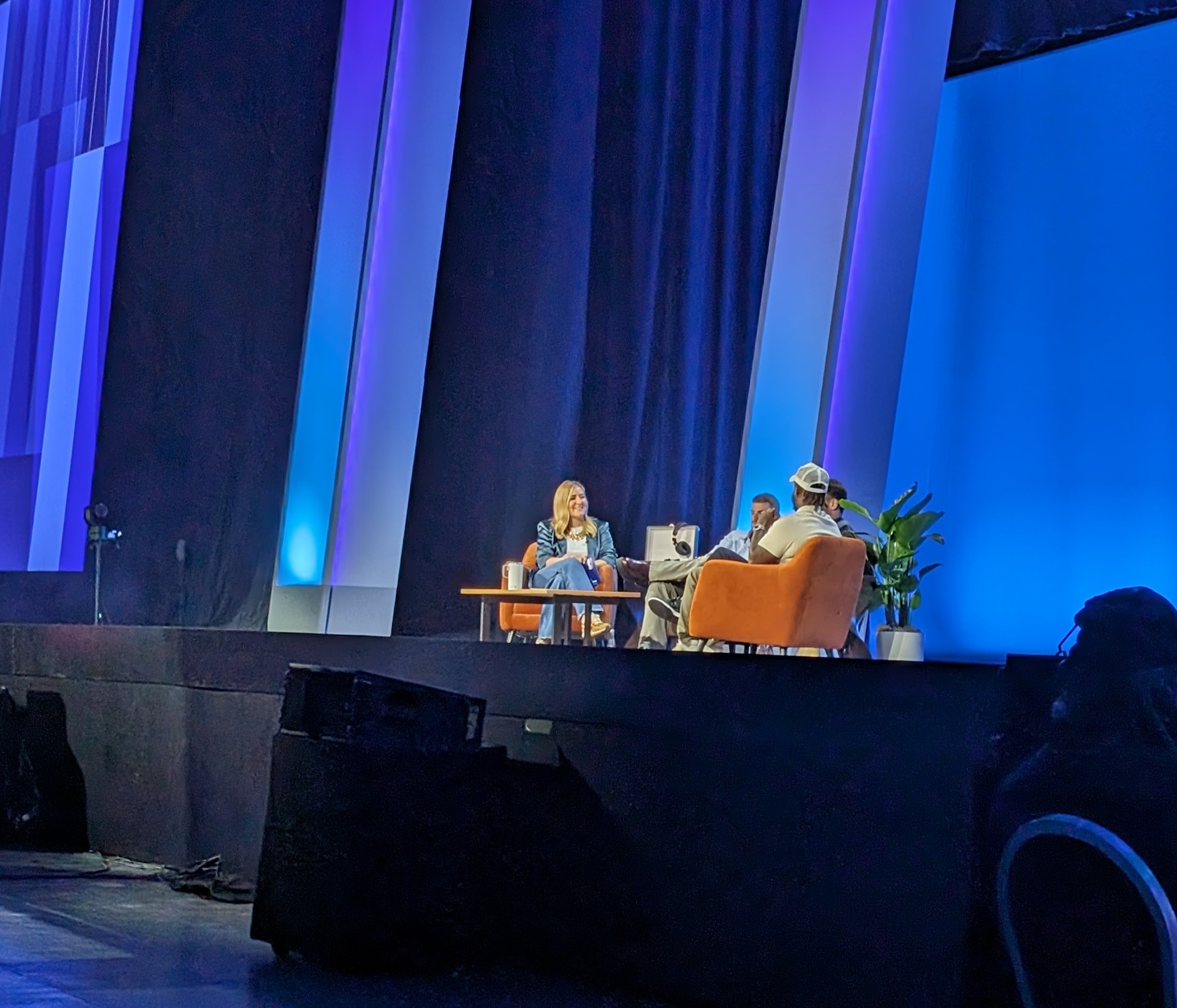
Asked about potential dream projects with AI or technology, the Chainsmokers say they'd like to experiment with voice-changing tech, naming Brian Eno as a particular inspiration.
"But there's also going to be a lot more shitty music," they say, as the barriers of entry are going to be lower.
As for T-Pain, he favors the visual, as he can't do everything himself! But as he struggles to articulate himself, AI could help him create what's in his brain in a much clearer way - althought Neuralink might be a step too far.
Wrapping up, the panel is asked what role tech has played in their careers - and it's pretty unanimous - none of them would be where they are without it!
"Technology is perhaps the most important thing we've done in human history...it's the one advancement that will never stop advancing," T-Pain says, in perhaps one of the most profound statements we'll hear this week.
And that's a wrap here, and the end of our day one coverage! We'll be back tomorrow with the day two keynote, which promises a deeper dive into some of the product announcements we heard about today, so be sure to check back tomorrow for all the latest updates and news.
Good morning and welcome to day two of Dell Technologies World 2024!
We're up early and getting ready for the second day of the blockbuster event, which includes a keynote hosted by Jeff Clarke, Vice Chairman and Chief Operating Officer, Dell Technologies.
We were told yesterday that this morning's keynote will focus more on the product side, with more time shining a light on new hardware releases.
Jeff won't be alone on stage though, with the agenda listing a number of special guests both from inside Dell, and customers including McLaren F1, Microsoft, Meta and HuggingFace among others.
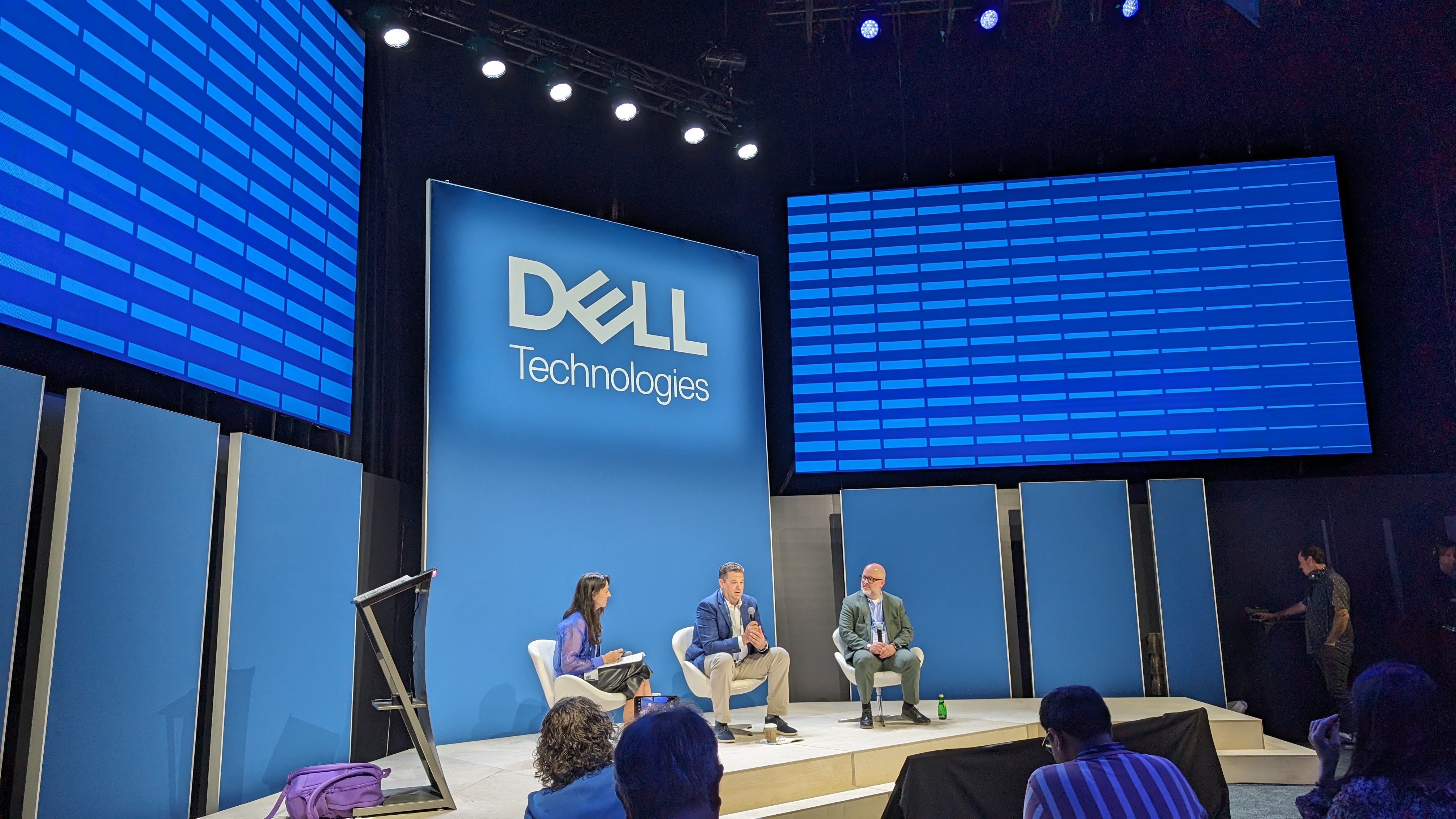
Before the keynote, we're at a press Q&A with Jeff Boudreau, Chief AI Officer, and Matt Baker, SVP of AI enablement - so let's see if anything interesting comes up.
"Our strategy for AI is to accelerate the adoption of AI, because we really believe this technology can advance human progress in dramatic ways," Boudreau explains, from healthcare to self-driving cars.
But to encourage AI adoption, there is a need for an open ecosystem, too, Boudreau notes, "and we think we're in a unique position to go do that."
Baker gives the idea of AI factories a shout-out, and by giving proven playbooks to customers, they can really make the most of it.
This all started with Dell's partnership with Nvidia last year, otherwise known as Project Helix - which got an expansion yesterday with the new AI factories.
Boudreau notes that the quality of data is usually a critical consideration, along with having the right talent to make the changes happen - but most importantly, having the right infrastructure that is able to meet the scale and challenges of AI.
"It's a shift all the way through the stack," he notes.
Now it's on to Q&A - with a question about the importance of running AI operations on-prem or in the cloud.
"Don't be a consumer of this technology - be a practitioner...and that means running it on-prem," Baker says.
When asked about changing plans over the last year or so, particularly around human-like AI, Boudreau notes that customers are looking for new offerings, but they need to boost productivity and boost experiences.
Baker adds a number of digital human experiences are in development right now, but Dell doesn't actually want its offerings to look like actual humans!
Final question is around the future of apps in the AI era - what role will they play?
Baker says we're currently at the first step, using AI to boost apps - but the next step is around taking them to a whole new level, where the technology brings together various elements of workflow in a "chorus of applications."
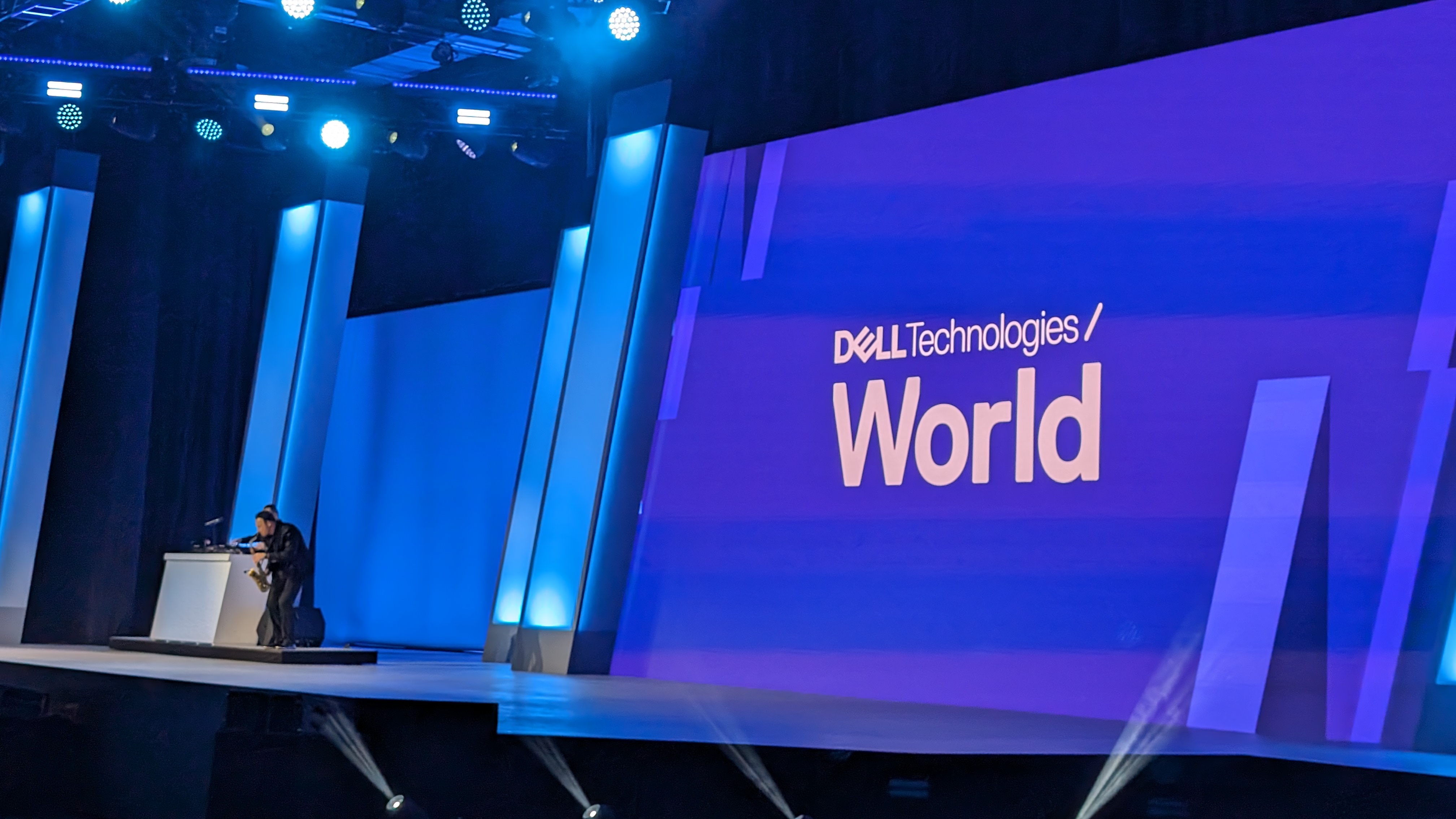
We're in and seated for the keynote - and this morning's soundtrack is more ear-splitting dance, but this time backed up with a live saxophone player.
It's exactly what it sounds like....
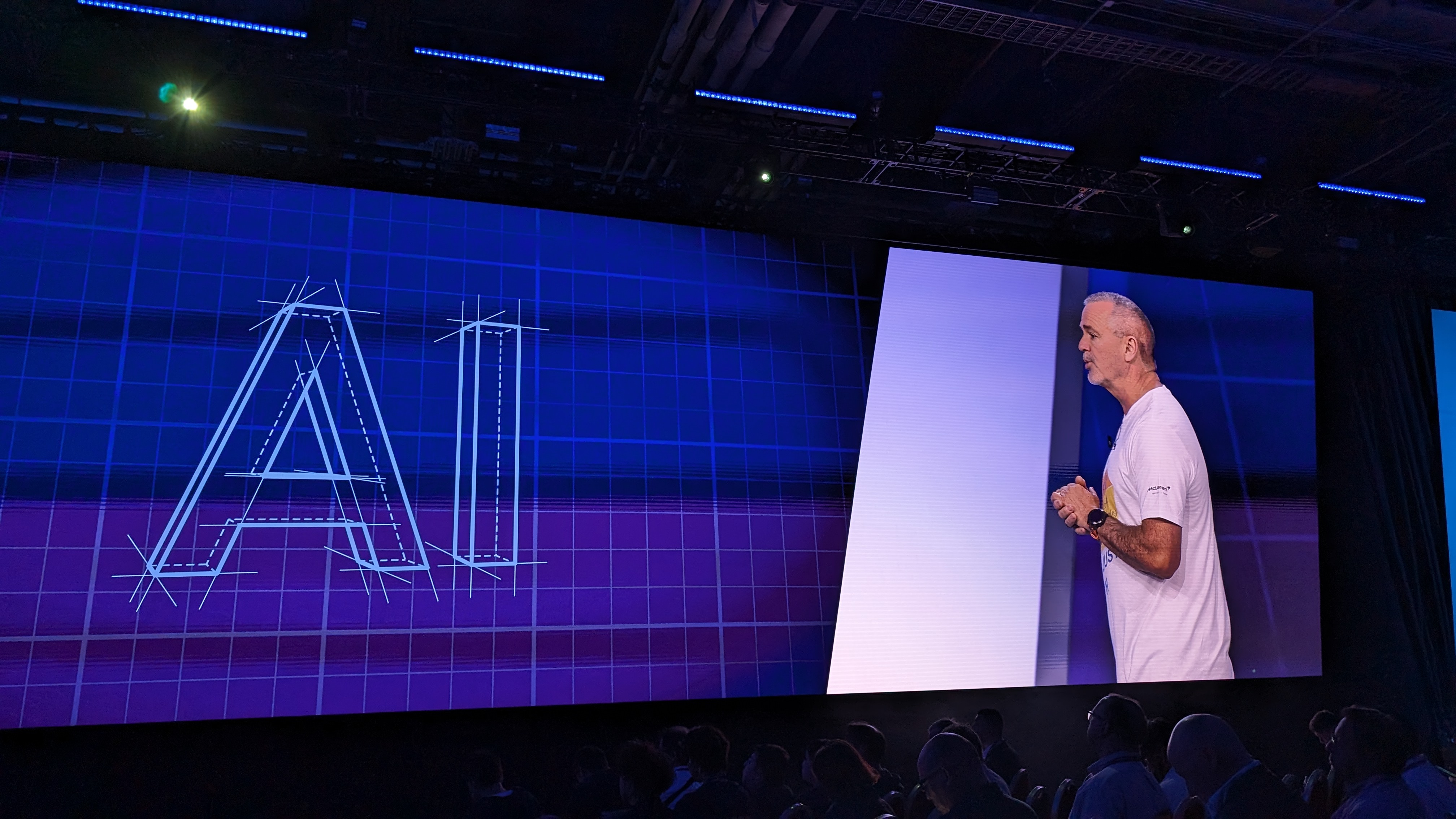
Here we go - Jeff Clarke, Vice Chairman and Chief Operating Officer, Dell Technologies, takes to the stage.
Today is all about geeking out, he says - we're going to be talking products into "what we believe is a defining moment for our company."
"It's been one hell of a year for generative AI," he adds, "although we're still in the early stages, it's clear this technology is different to any other...it's faster, it's more disruptive."
"The last time the world saw something like this was nearly 300 years ago," he says - the industrial revolution.
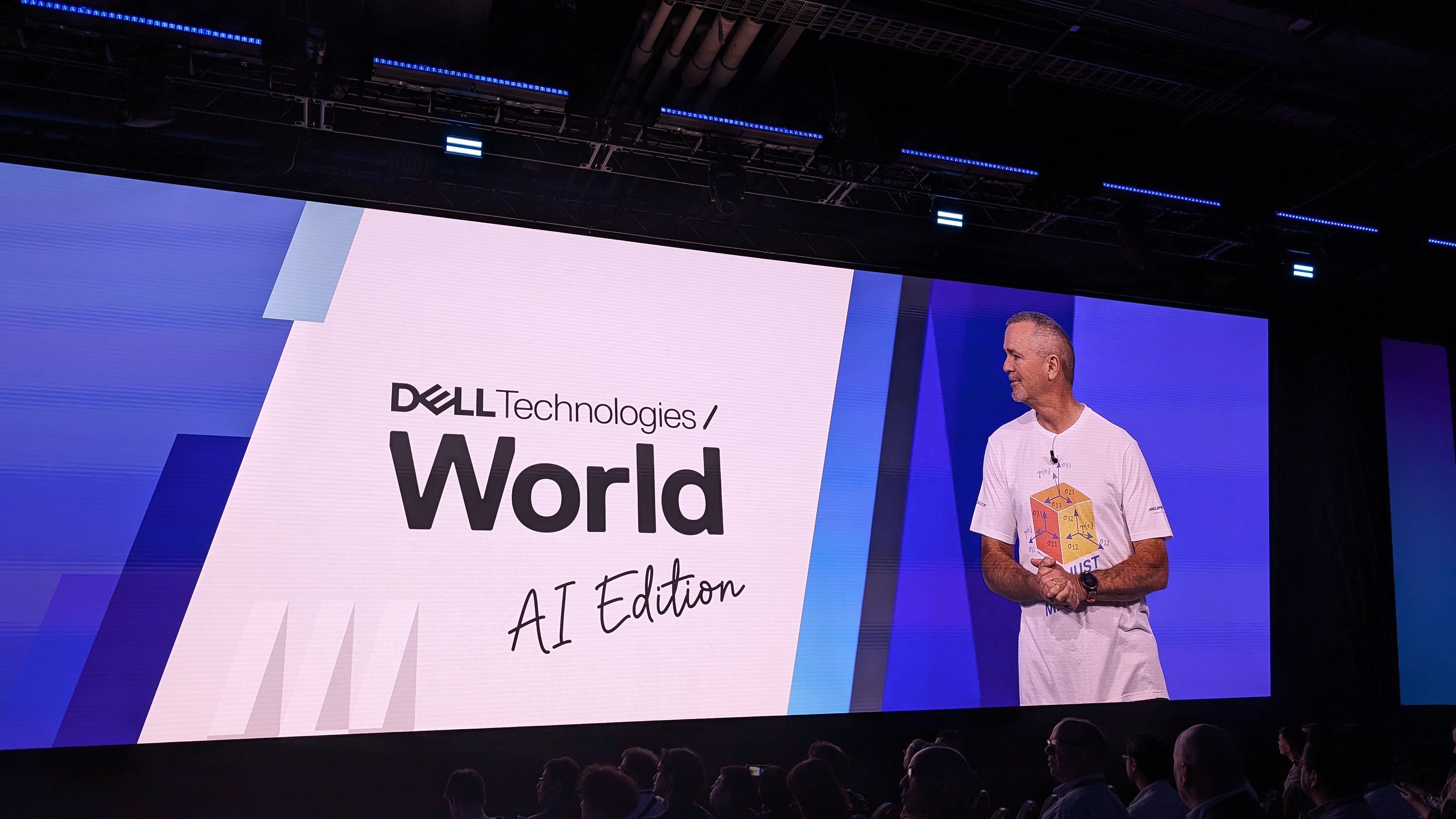
This new "AI revolution" is set to push forward society more than anything since the industrial revolution, Clarke says, creating "knowledge like we've never had before."
A "vastly different computing architecture" will be needed to get through the huge amounts of data being created, Clarke notes.
"Our strategy is really simply - it's to accelerate the adoption of AI for all of you."
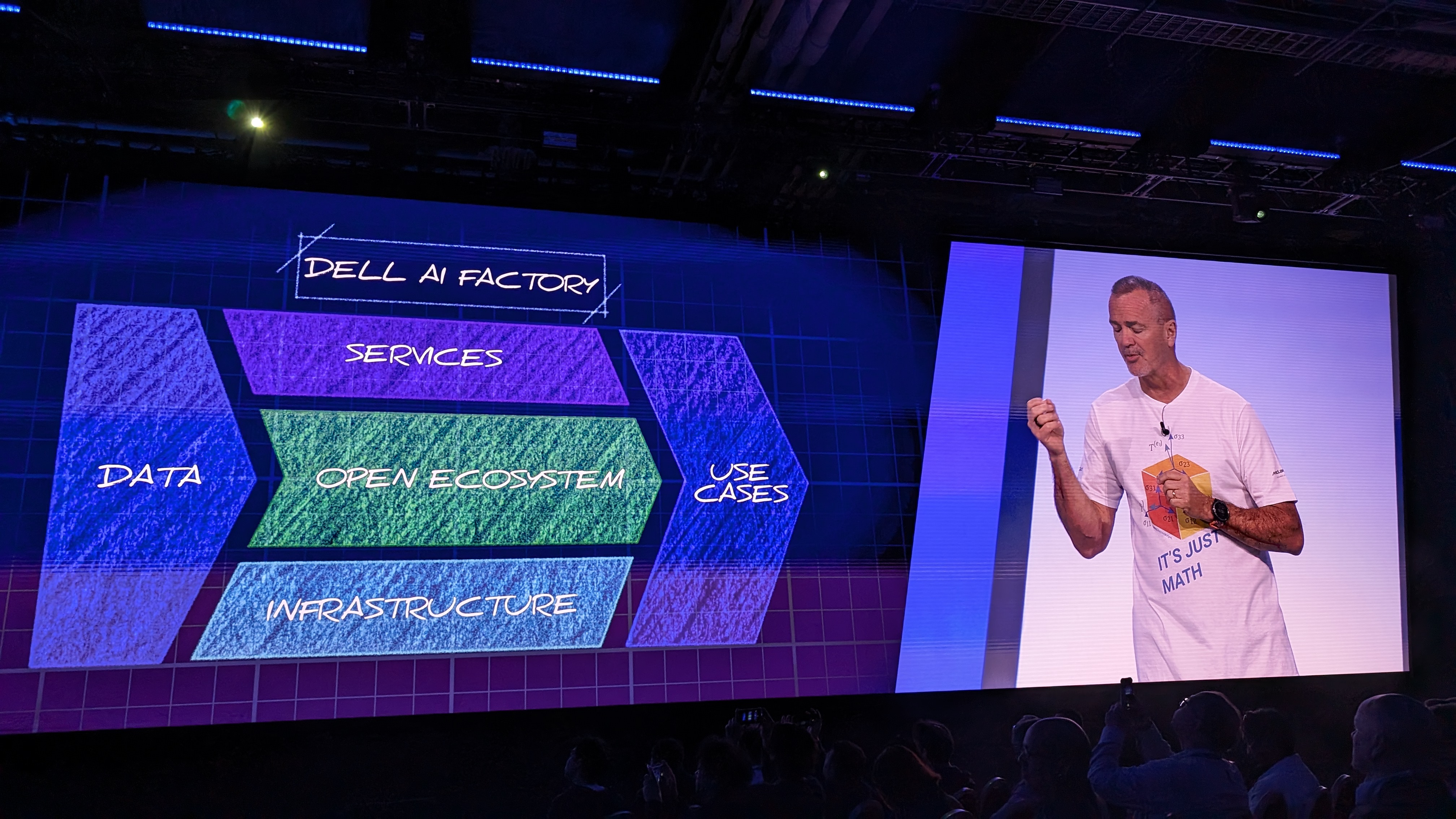
"The traditional data center architecture is ill-equipped for these AI workloads...a whole new computing architecture has emerged, and we're going to deliver that," Clarke declares, mentioning the newly-announced AI factories launched by Dell yesterday.
"AI factories are fuelled by your data...you're going to gain insight about your business that you've never had before," he adds.
"AI workloads need unbelievable intensity."
"You've gotta start getting ready now...the ride has just begun," Clarke says, looking ahead to what Dell expects the computing needs for AI will be by the end of the decade.
Just the 27 petaflops, that is - and data center demand will also skyrocket, meaning there is a significant need for more capacity and infrastructure.
But Dell also reckons there will be around two billion AI PCs by then - all Dell machines, I bet?
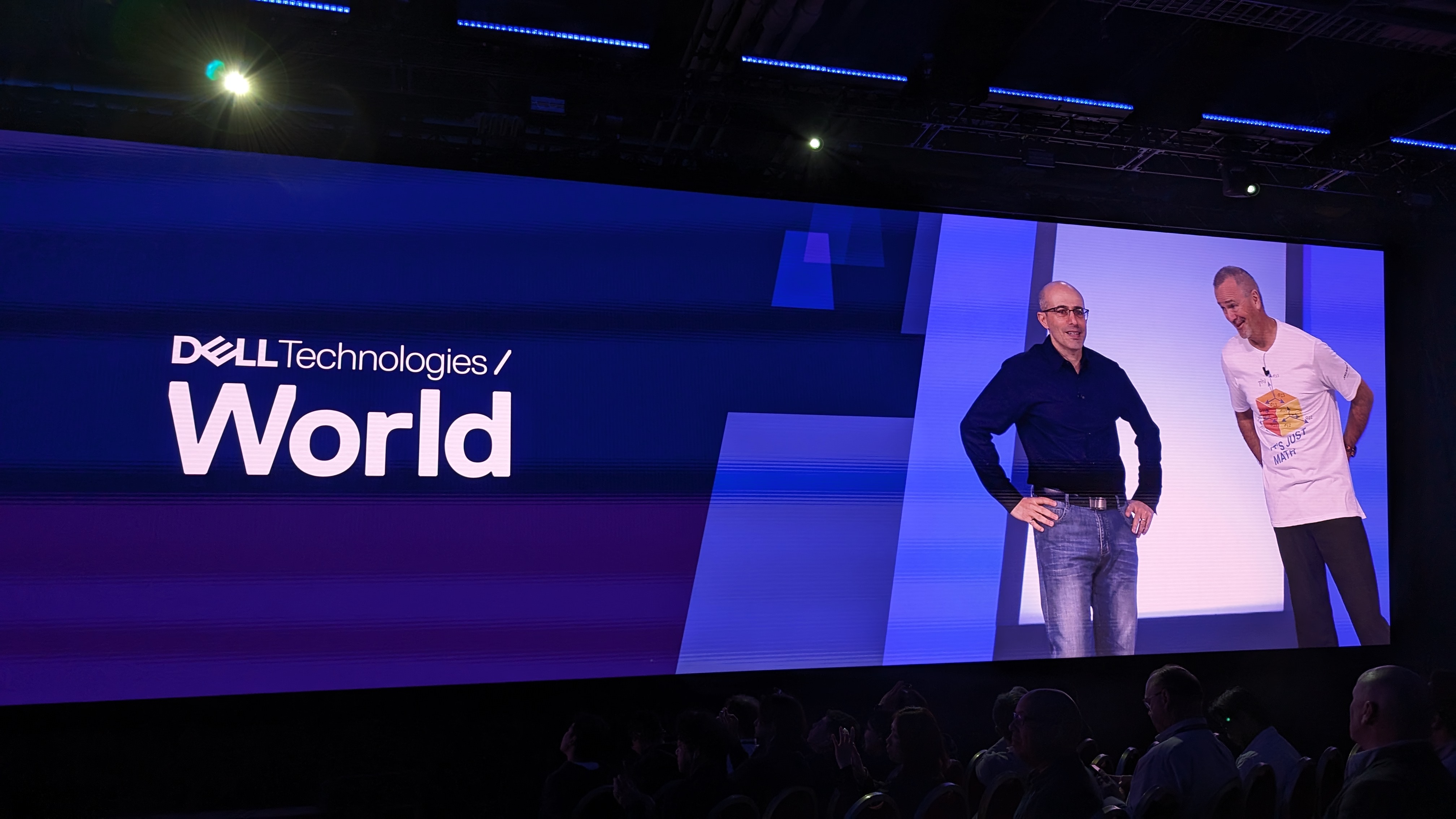
It's time for our first guest, and Clarke welcomes Charlie Kawwas, Ph. D., President, Broadcom to get more in depth on high-speed networking and its role in AI.
Although we have strong networks today, things are set to change majorly in the next few years, Kawwas says.
AI workloads are massive, and require a lot of inter-communication and syncing between different chips and units - so making sure back-end networks in particular are up to speed is a critical consideration.
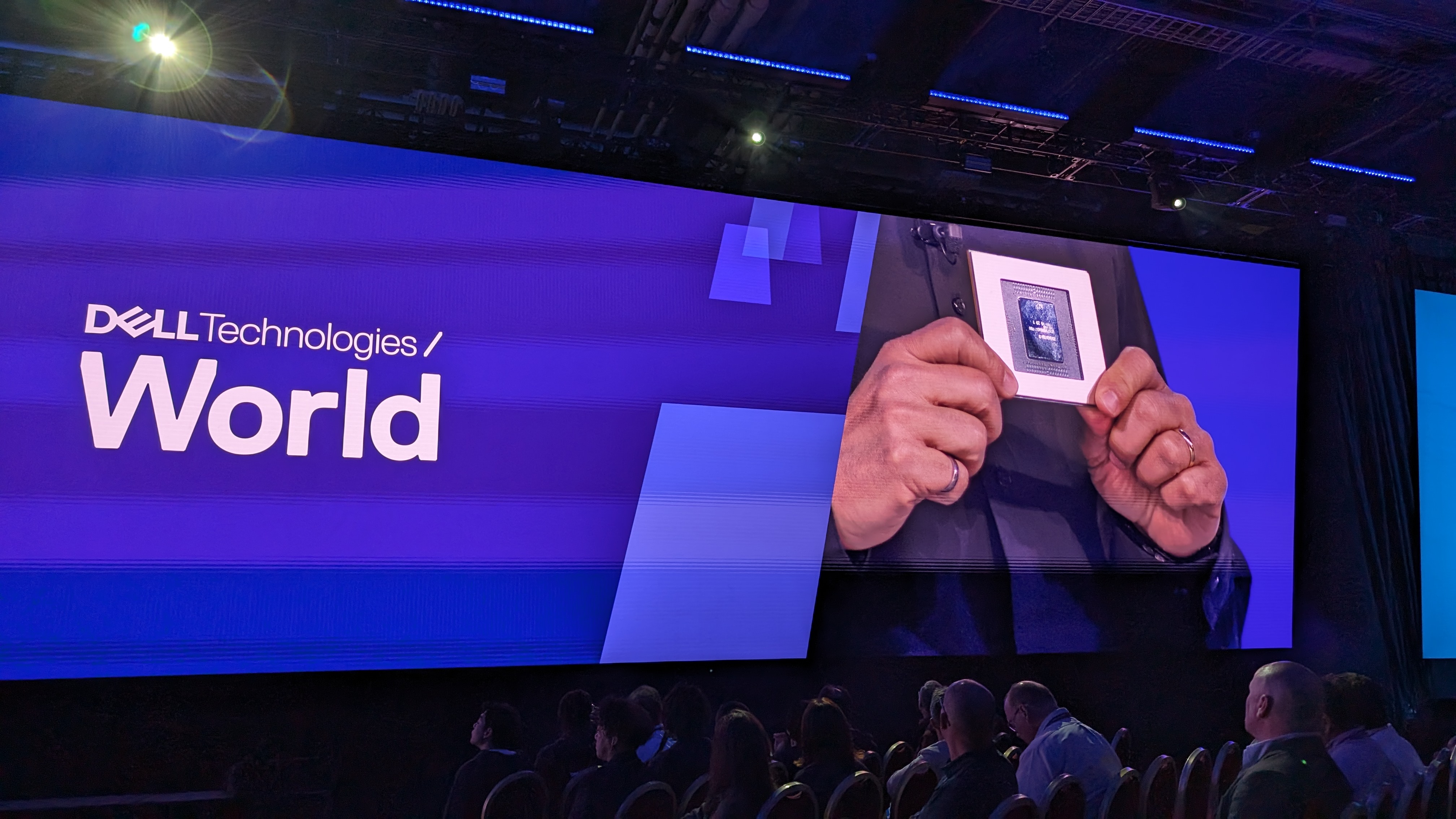
Clarke calls out some of Dell's announcements from yesterday, which Broadcom is using to push forward its networking portfolio.
Kawwas has also brought some toys - including a 51 terabit per second monolithic die, providing high power and low latency, and a super-speedy NIC card to allow for fast connectivity across the board.
"This is the beginning of a whole new set of innovations," Kawwas says, " we're going to have bigger and meaner GPUs, more power, more performance...and these are going to require innovation."
Luckily, Dell is a wonderful partner!
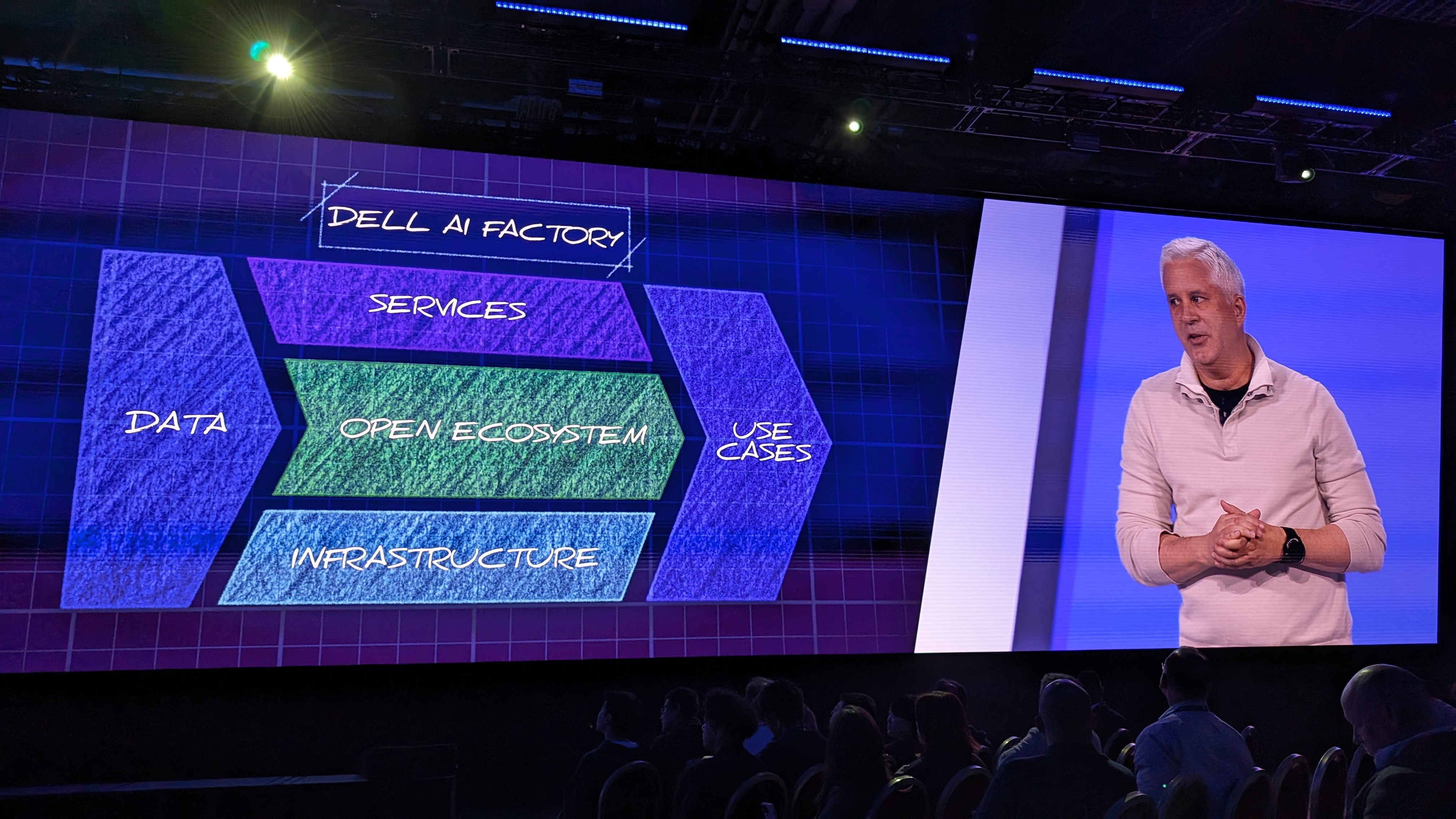
Kawwas leaves the stage, with Clarke moving on to ISG, and introduces Arthur Lewis, President, Infrastructure Solutions Group, Dell Technologies to talk us through it.
"There's no question that we're living in one of the most interesting and exciting times in human history," he says.
"It's all about the data, the rapid advances that we see in AI that will accelerate the value that the world's data brings to organizations of all sizes."
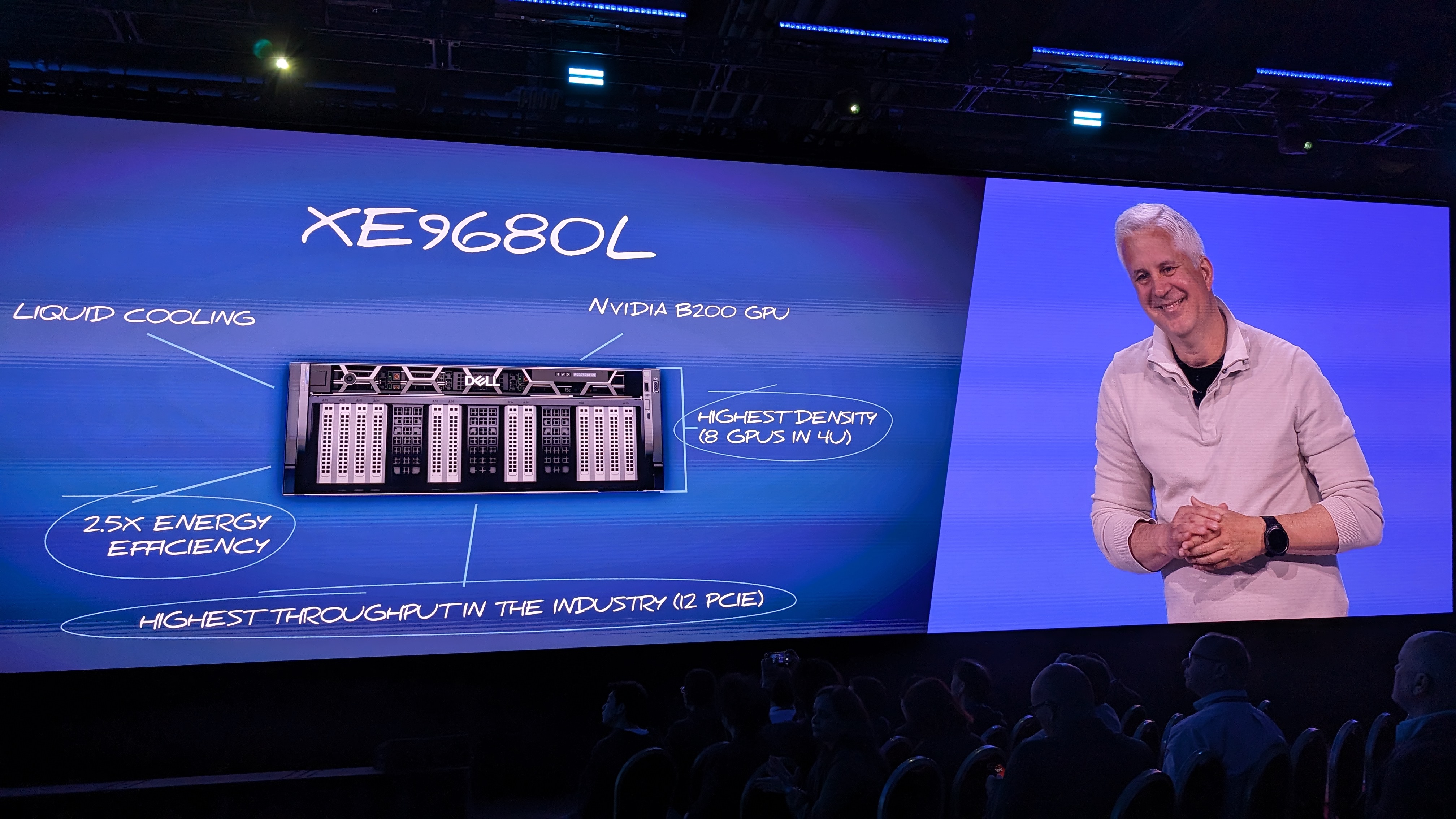
First up - accelerated compute, as Lewis walks us through some of the company's new releases.
There's the XE9680, offering the highest density, highest throughput and best performance around today - but there's also a new super-sized version, the XE9680L, designed specifically for liquid cooling, and offering "industry-first" density and boosted energy efficiency.
There's also new data center cooling racks, offering greater cooling options than ever - ideal for those new AI workloads.
There's also new networking tools, like the Broadcom-supported Powerswitch Z9864F-ON we just heard about, alongside a full suite of Nvidia supported switches, DPUs and NICs.
And storage? Dell has that covered - there's a boost to Powerscale, with the new Powerscale F910 designed for unstructured data, giving huge density and speed upgrades - twice as fast as the nearest competition, Lewis claims.
And something new - Project Ligthtning - a "game-changing" parallel file system for unstructured data, offering huge performance and speed upgrades.
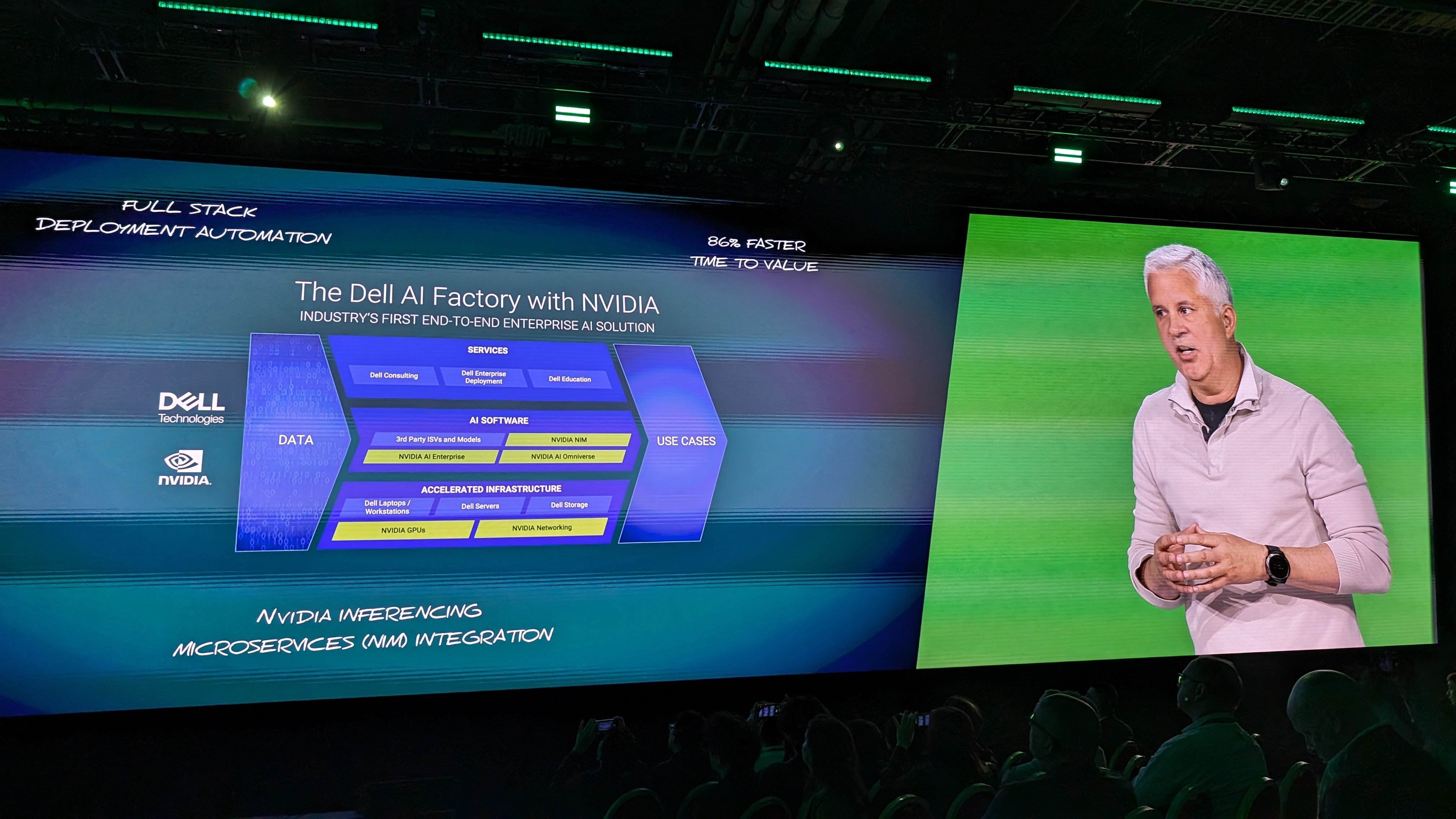
There's a lot of love in this room for Nvidia, it's clear.
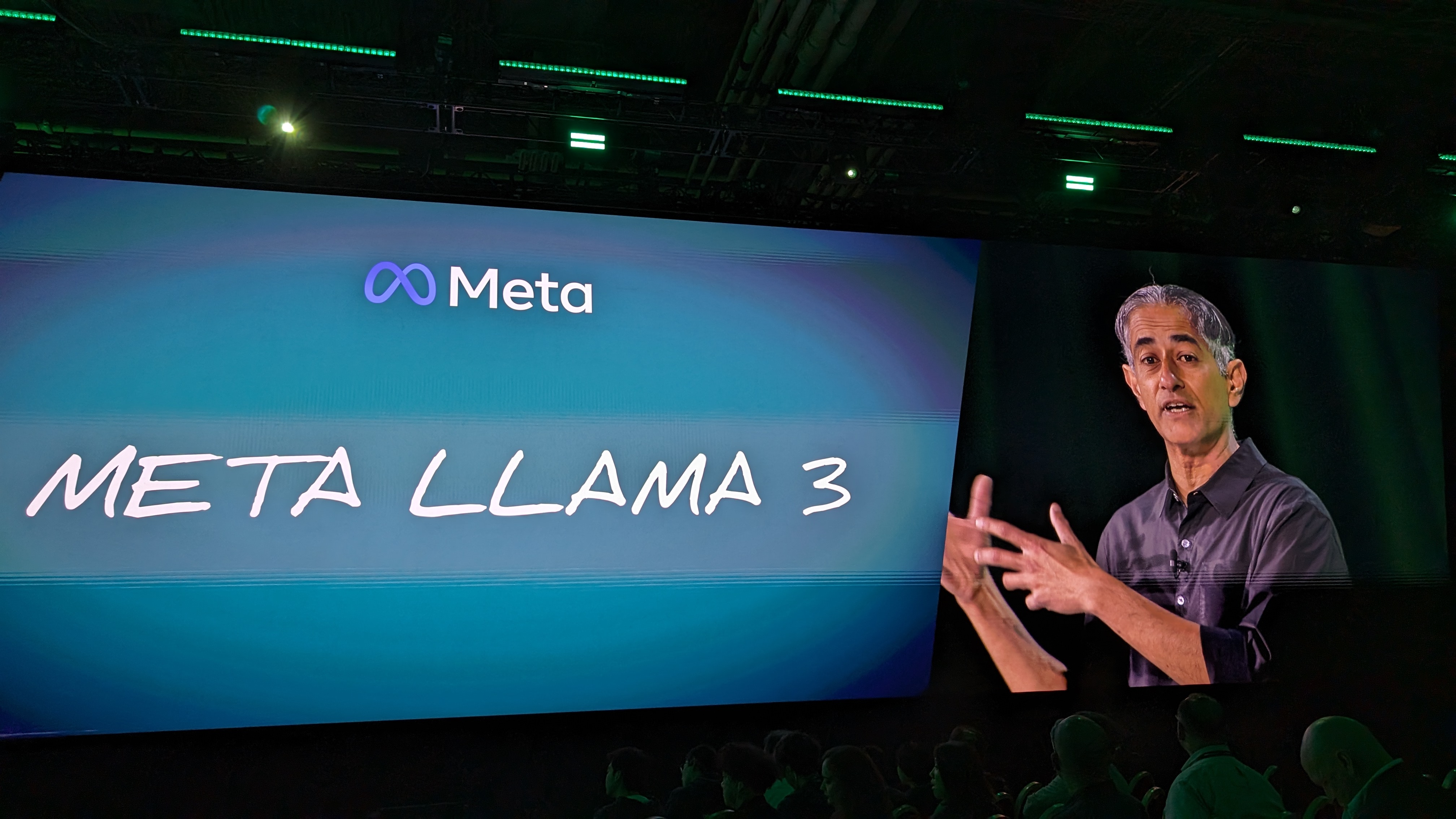
After that barrage of news, we're going to see some demos from partners.
Lewis welcomes Ihab Tarazi, Senior Vice President and Chief Technology Officer, AI and Compute, Infrastructure Solutions Group, Dell Technologies, to the stage to kick these off.
In turn, he invites up Sy Choudhury, Director, AI Partnerships, Meta, to hear more about how the company is using Llama 3 to boost open ecosystem development in AI.
After a quick tour around what Meta Llama 3 can do for companies, including its greater accuracy, better reasoning and higher fidelity, we're reminded to keep in mind that using open models will allow us to use your data, and your model - in your AI factory.
We're given the example of a product development pipeline, including design, market research, code agent and validation - all of which can be covered by using an open AI model like Meta Llama 3.
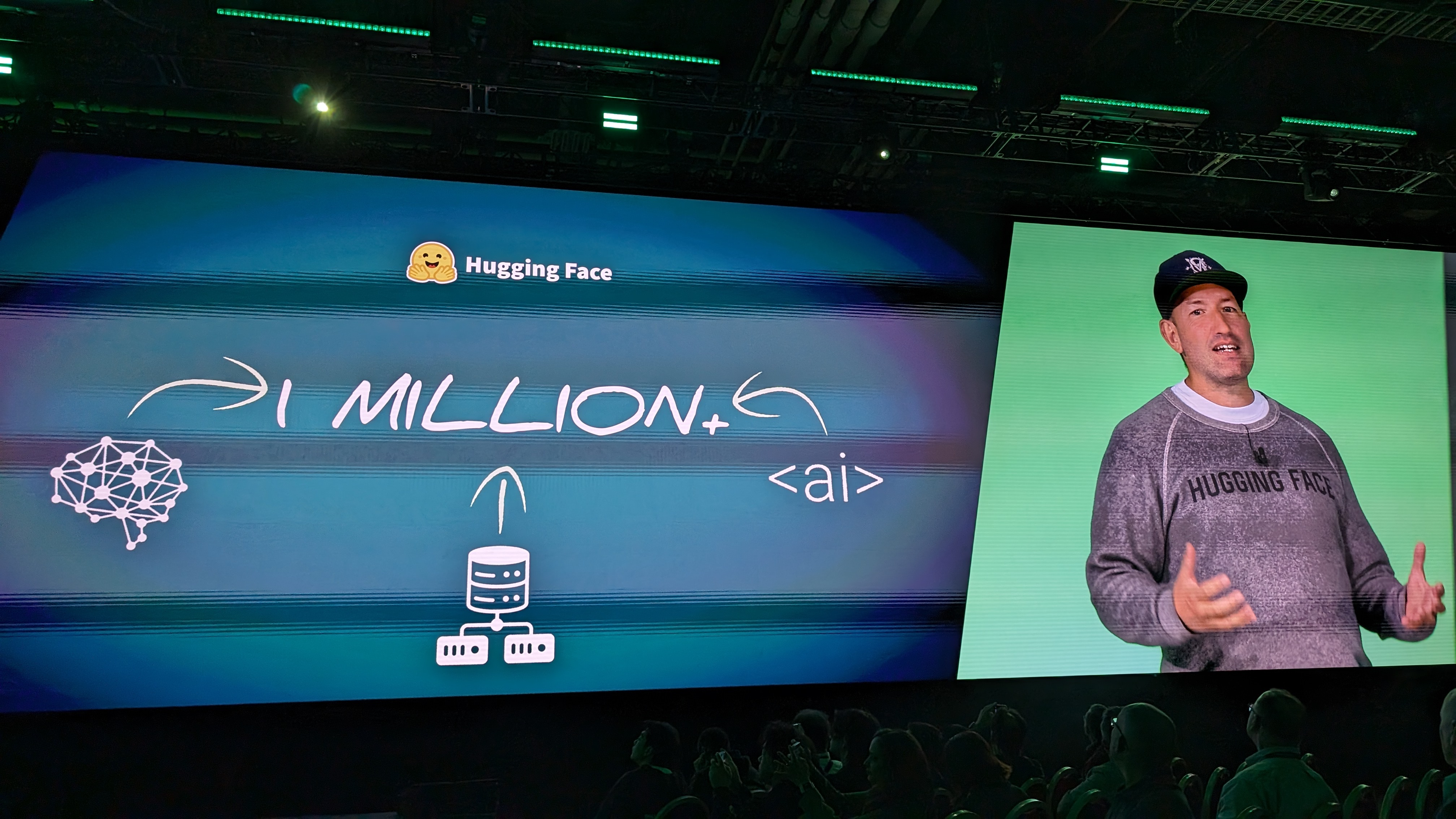
Next, we're turning to developers, with Jeff Boudier, Head of Product, Hugging Face, the next to join Tarazi on stage.
Boudier is here to talk about why open source AI is the only choice for developers looking to build effective and efficient models - especially when it comes to security, privacy and compliance.
The two companies are announcing the Dell Enterprise Hub, an easier way for developers to use Hugging Face customers to quickly and safely deploy models and containers.
Next up, we're turning to PCs, with Sam Burd, President, Client Solutions Group, Dell Technologies, taking over presenting duties.
"The PC is the world's pre-eminent productivity tool...and we've been building AI into them for years," he notes.
Now, imagine bringing an LLM or small language model to mainstream PCs...surely not, right?
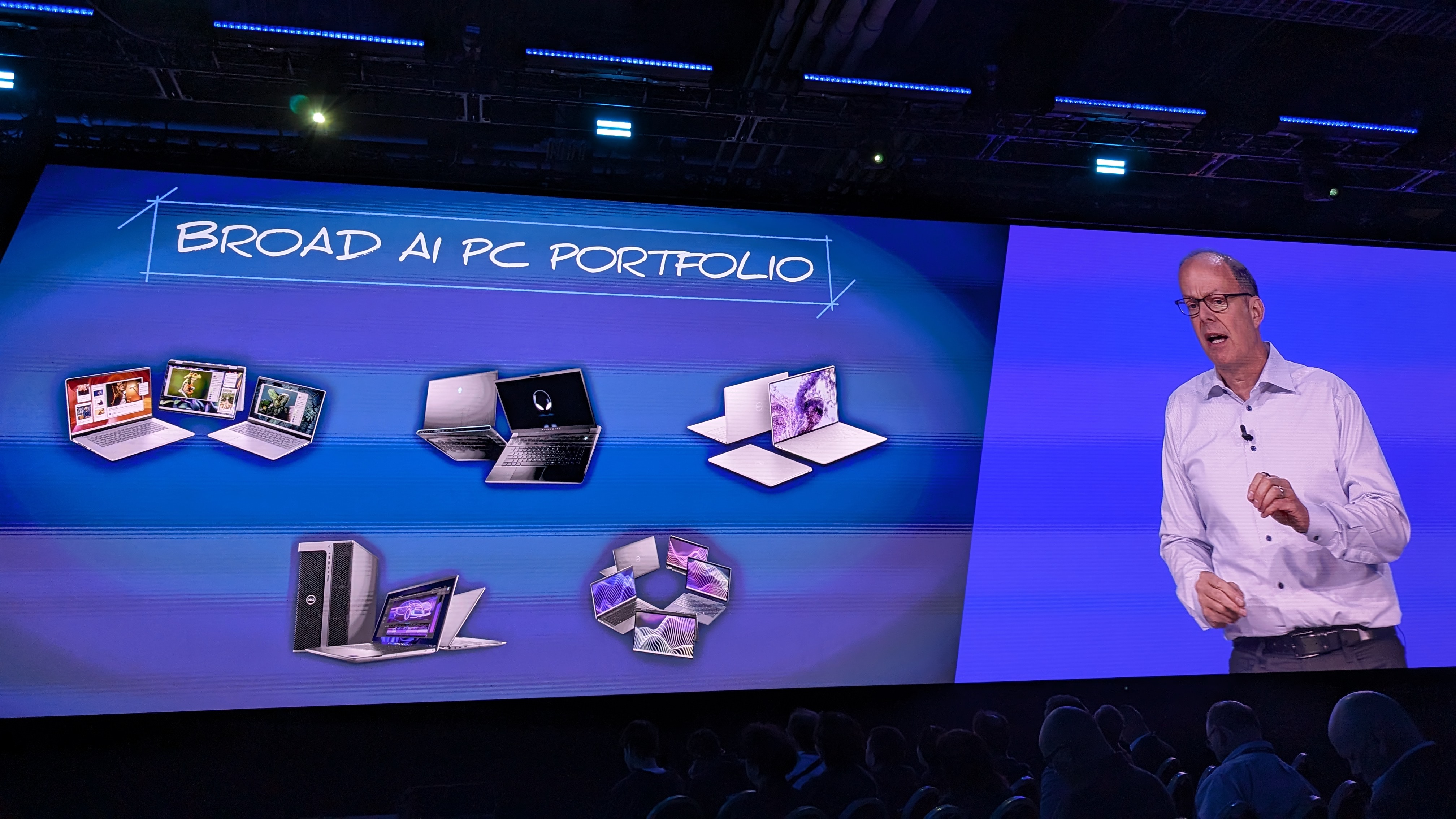
Maybe not - not in the age of AI PCs!
"They're going to become your true digital partner," Burd notes, adding the company is "going all-in on AI PCs" from workstations to business PCs to gaming rigs, allowing everyone to unlock their potential today.
"Companies that win, invest in technology - and AI PCs are a key part of that," he adds.
Burd is then joined by Dounia Senawi, Chief Commercial Officer, Deloitte, to tell us about how it using AI tools to boost developer productivity.
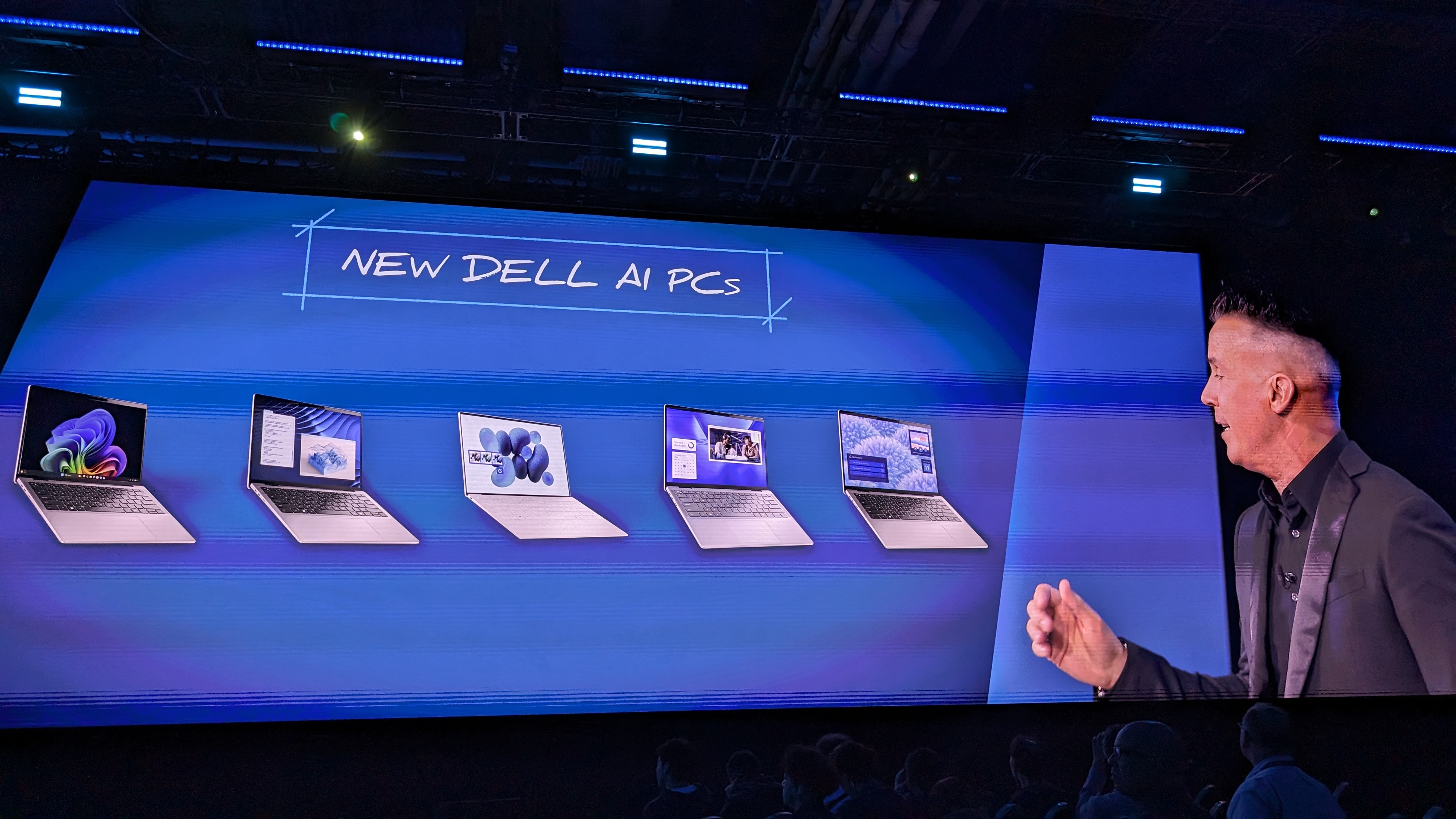
But to talk even more about the potential of AI PCs, it's time to hear from another major player in the industry - Burd welcomes Matt Barlow, Corporate Vice-President, Windows Microsoft to the stage.
Dell announced five new AI PCs this week - and software also plays a key role, with Barlow saying they will help unleash the new AI-powered working world.
He delves into the new Windows Recall feature, which allows users to track down information from anywhere on their PC, helping save time and resources both at work and at home.
Barlow is keen to mention the data protection controls associated with Recall, which can block out certain files or areas completely.
It can even work offline - giving you the opportunity to work when travelling, even on Airplane mode.
We're nearing the end, but there's still one more special guest to come - Jeff Clarke returns to wrap things up, and to finish with a flourish, he welcomes Zak Brown, CEO, McLaren Racing to the stage.
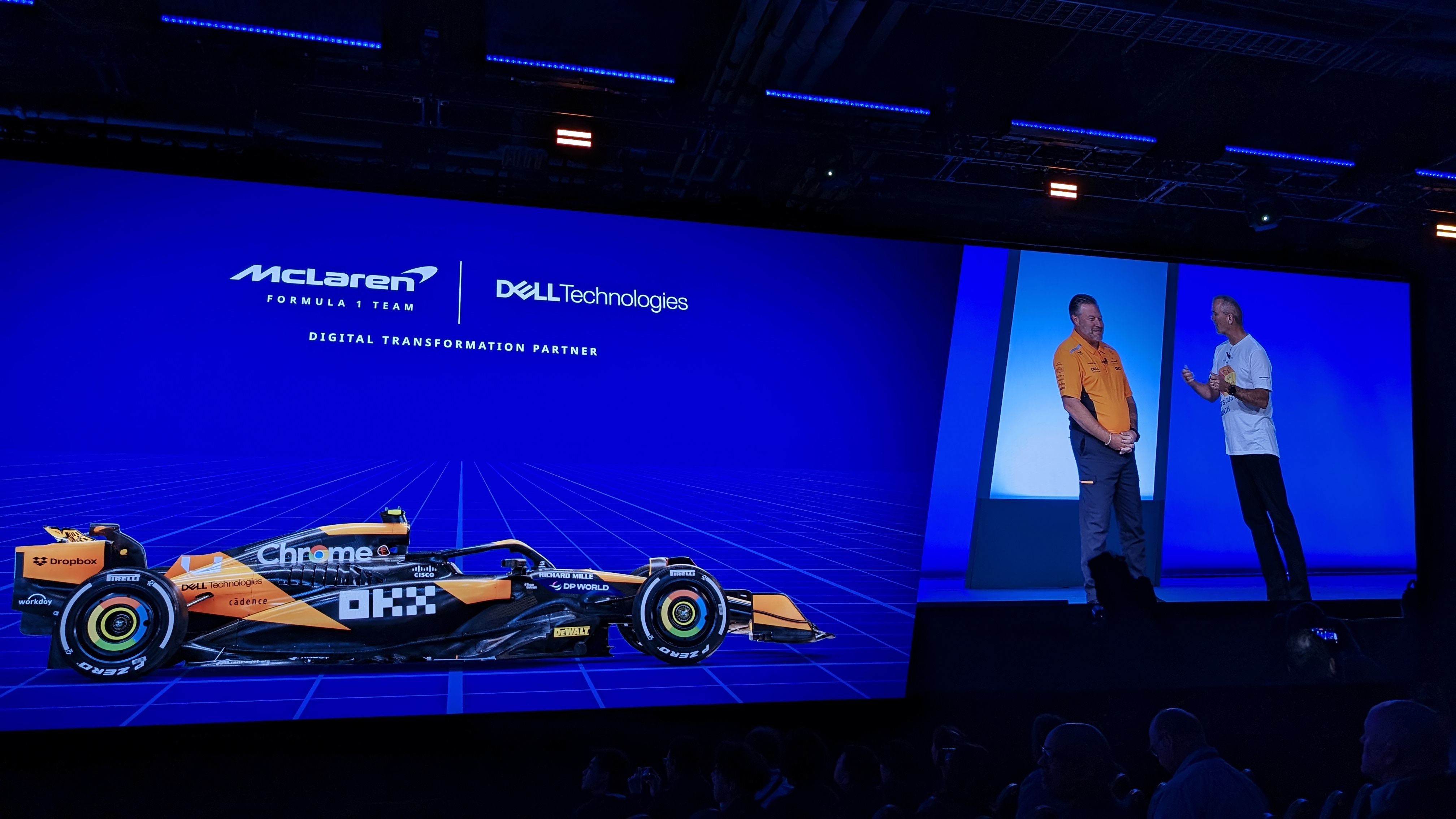
Head of the Formula 1 team, Brown is keen to talk about how AI on the track can help McLaren push the limits.
The team gets a tremendous amount of data every race, he notes, (around 1.5TB of data each race weekend) and it is using the Dell AI factory to get the most out of all of it - not just on the track, but running digital twins, to get that smallest advantage whenever they can.
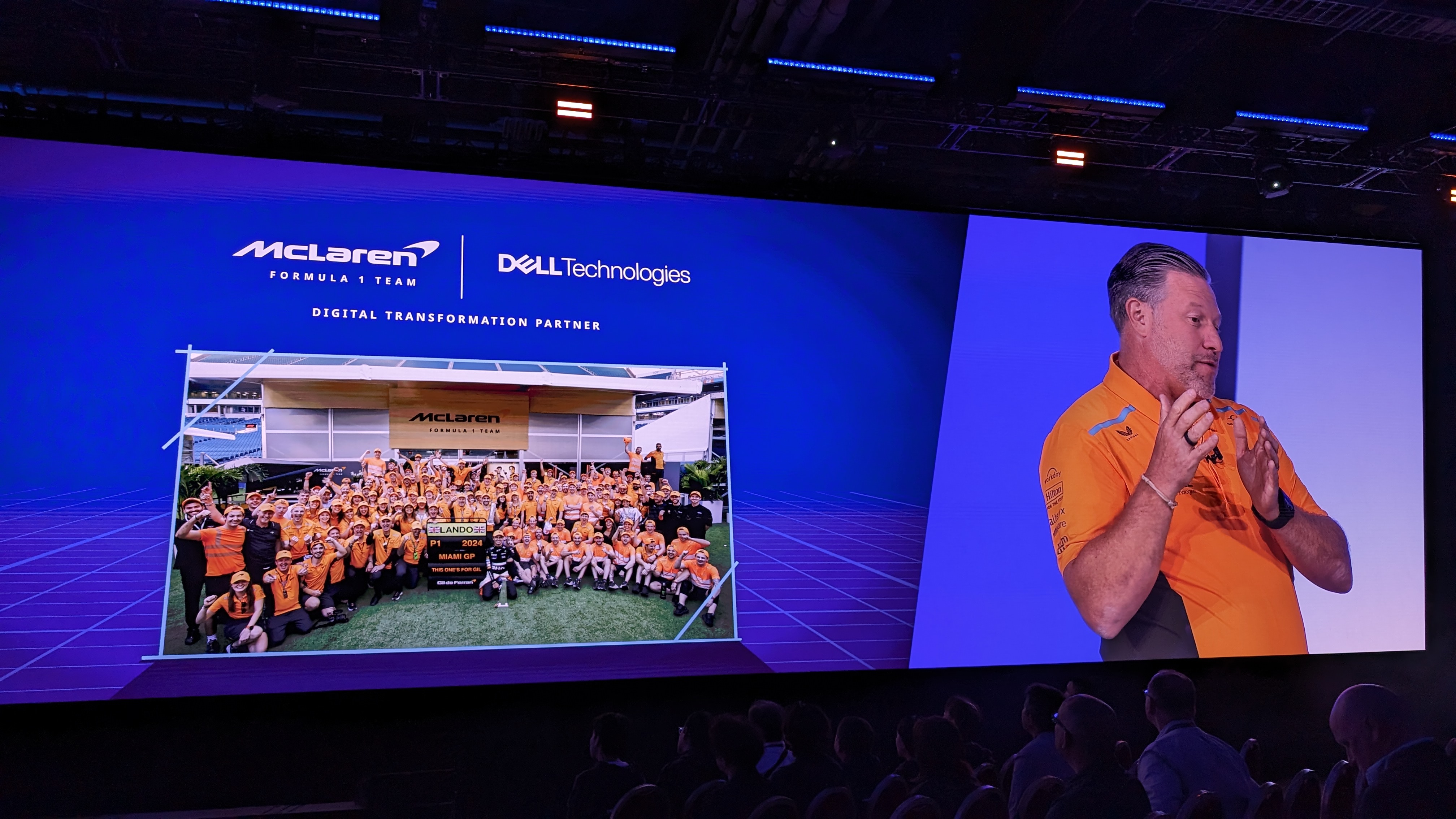
Brown notes that without this constant development, the team would be dead last, but AI is also being used within the company.
"Everything points to performance," he notes, highlighting the cost cap in the sport that means every pound counts.
"We see AI powering our people," he says, noting that the 2026 McLaren race car will be the most AI-enabled car in the company's history.
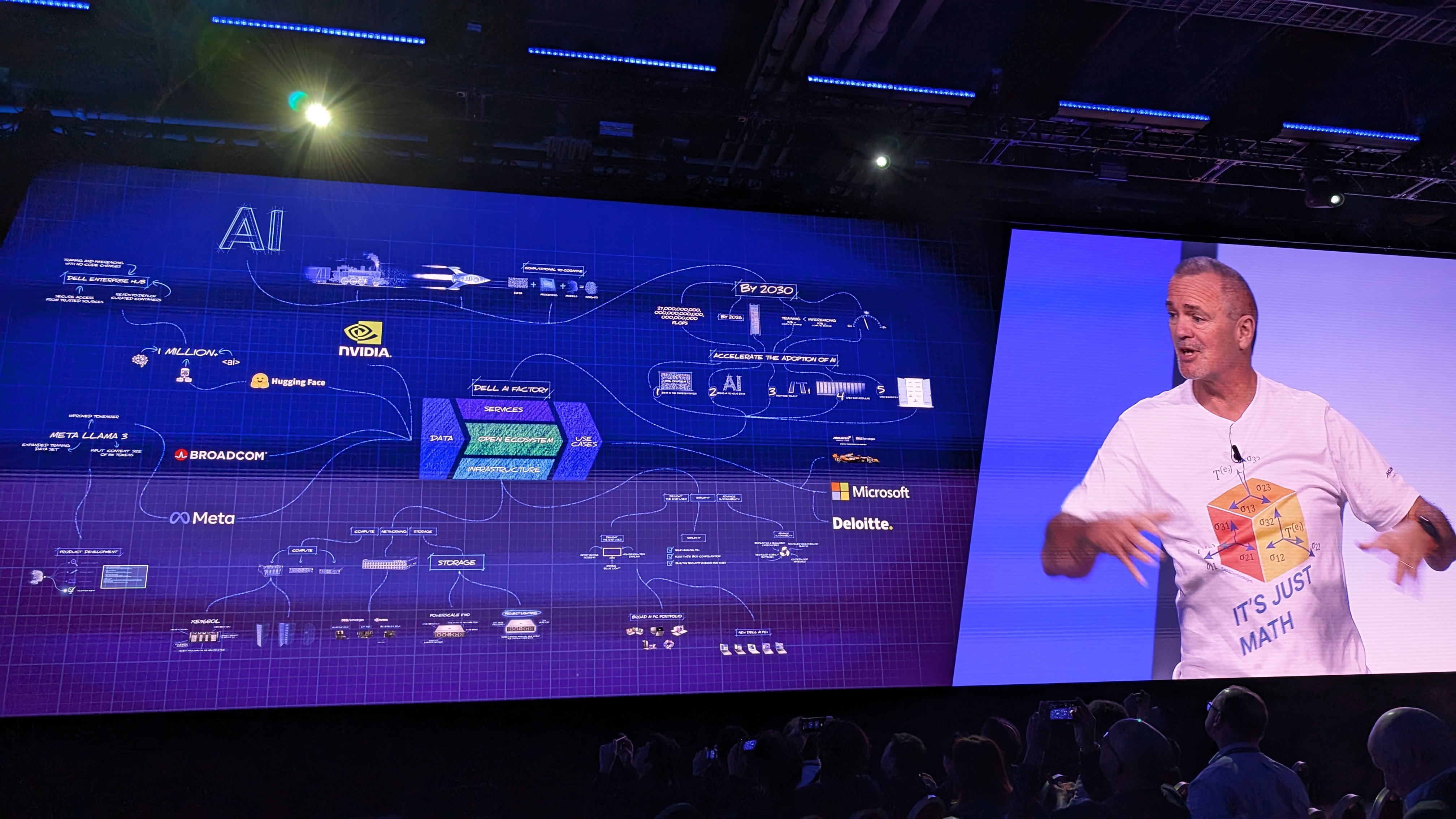
And that's a wrap on the day two keynote! Clarke pulls up a full blueprint of the Dell AI factory structure - and leaves us with a pledge to try and make AI easy, using Dell.
We're not done for the day yet though, so stay tuned for more updates very soon...
We're straight back, with a press Q&A with Jeff Clarke, Arthur Lewis and Sam Burd - let's see if they have anything interesting to add to what we heard in the keynote.
Asked about the changing needs of the PC market, especially when it comes to the AI market, Clarke notes that, "it's about to get really fun."
"I can't remember a time when we've had so many choices to make...think about what we're going to be able to make going forward."
"How could you not be excited to help build PCs of these next generation?"
Burd agrees, noting he has been challenged to simply deliver great products to their customers.
"With more choices than ever, we're going to deliver great projects...this is the moment the PC was made for."
Next is a question about getting silicon makers, and companies like Microsoft, to agree on possible best choices or picks for a common vernacular.
Clarke says it will be a major challenge, even around simple labels and tasks, noting "our job is to help our customers not have to deal with that", but adds the expansion of choice does make things trickier for users.
Burd adds the borders are beginning to blur, as productivity apps and AI being built into workflows.
Asked about hybrid cloud and the storage future, Clarke highlights how Dell is trying to make data more mobile, so your business can get access wherever you need it.
"What we have found...is customers are being more deliberate about what data they're allowing to leave their four walls," he says, often requiring legal and compliance clearing before it can happen.
Lewis adds that Dell is "far up the stack on every level" so can handle most data queries or questions without too many problems.
And that's a wrap for now - we're off to grab some lunch, but we'll be back with more insights, news and sessions soon!